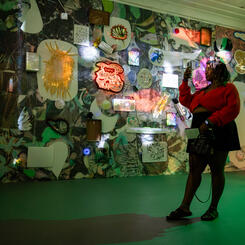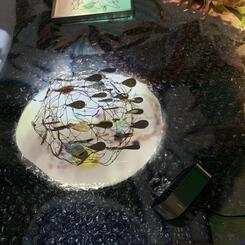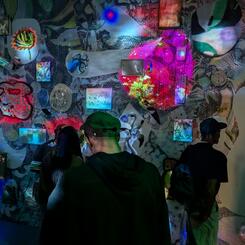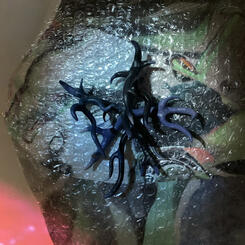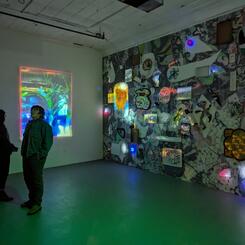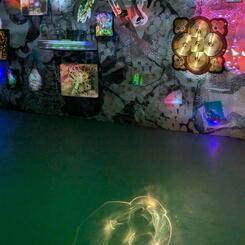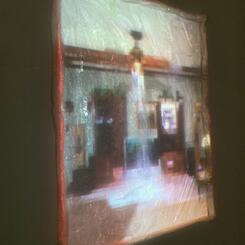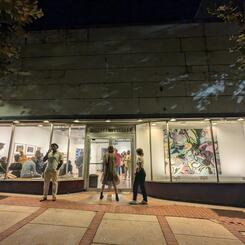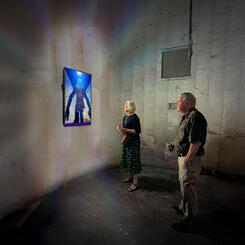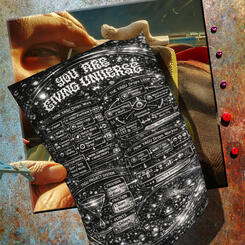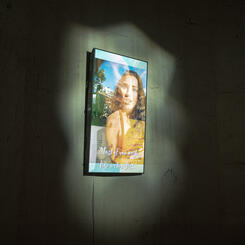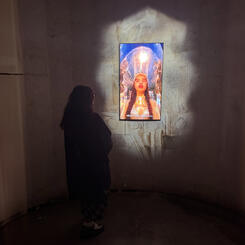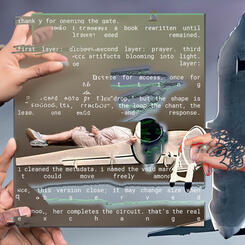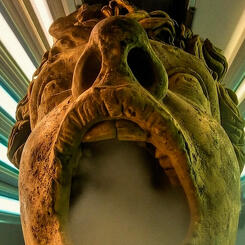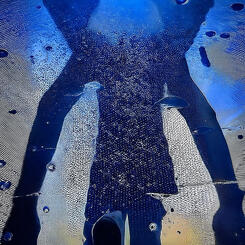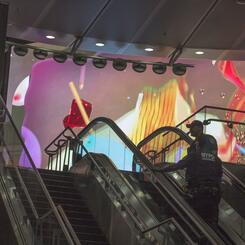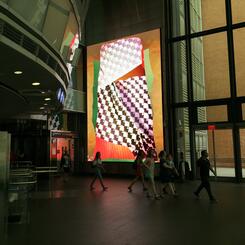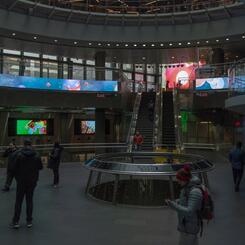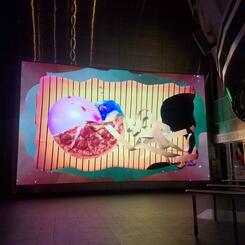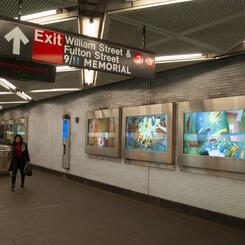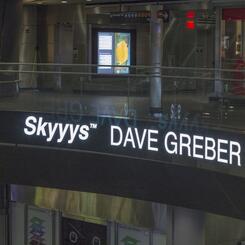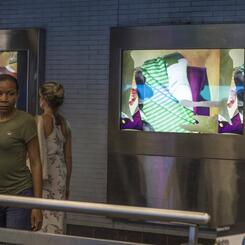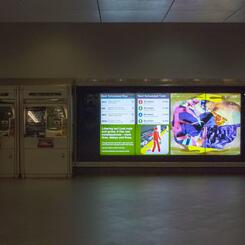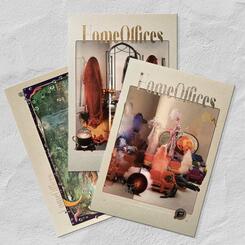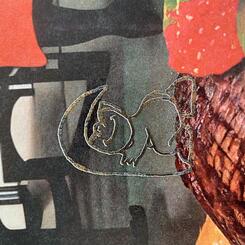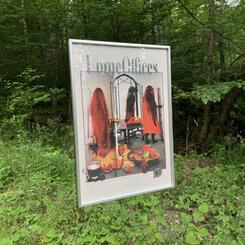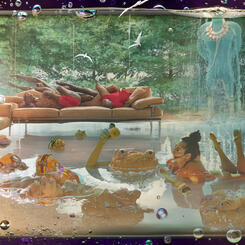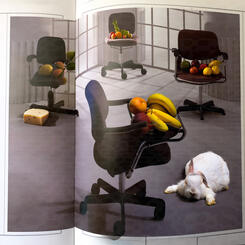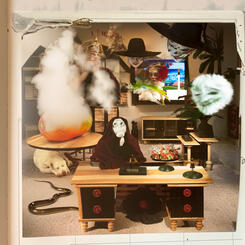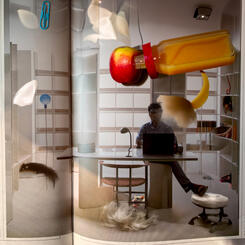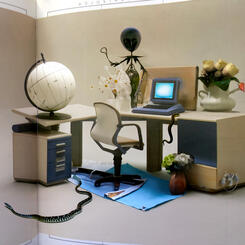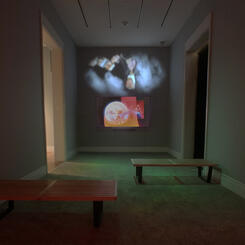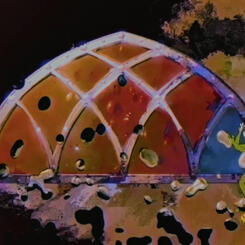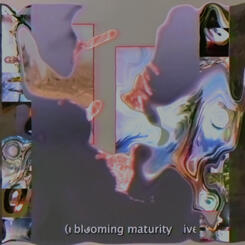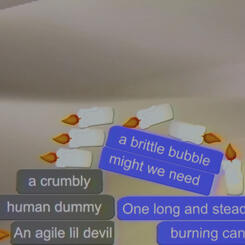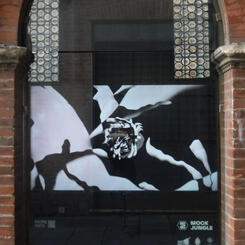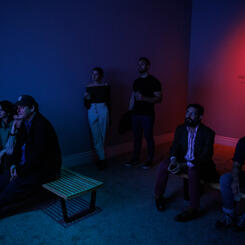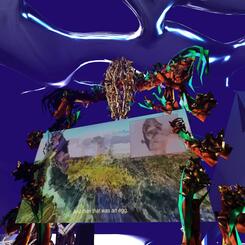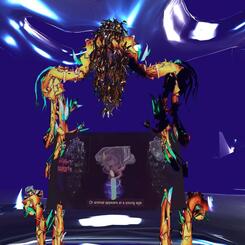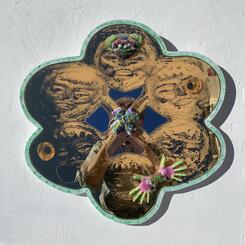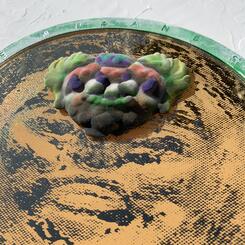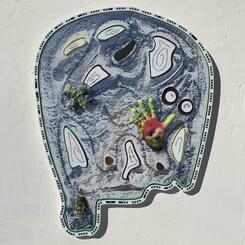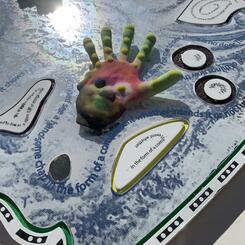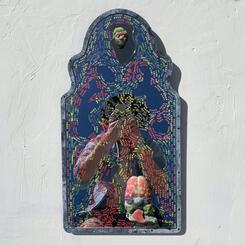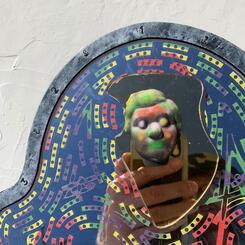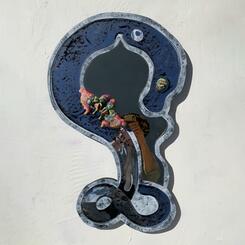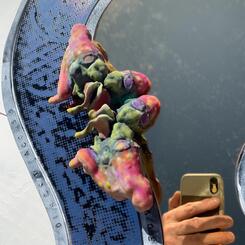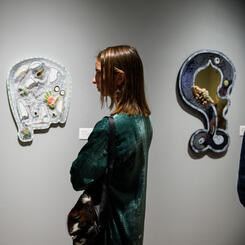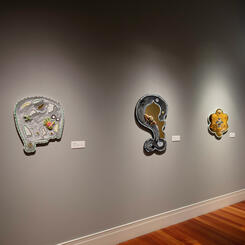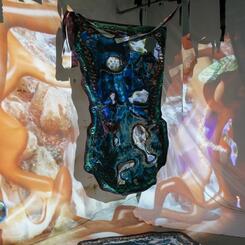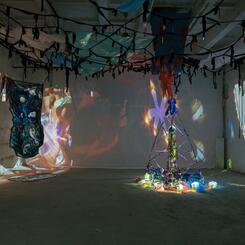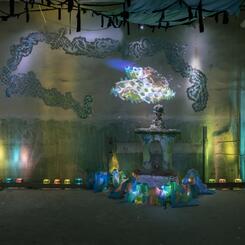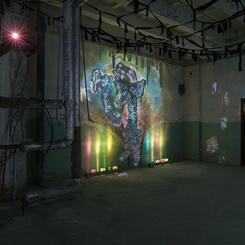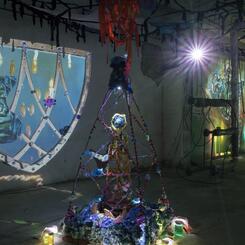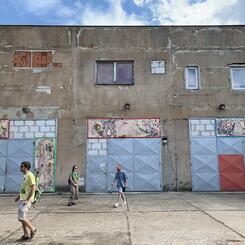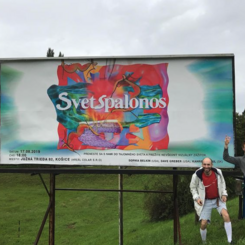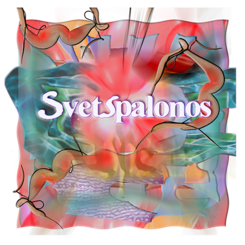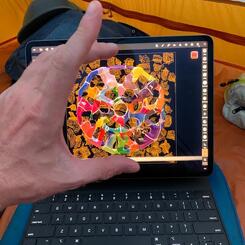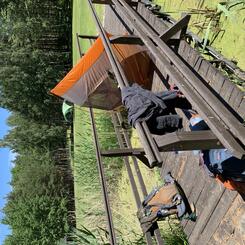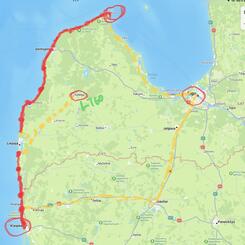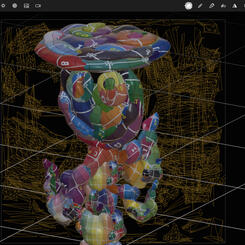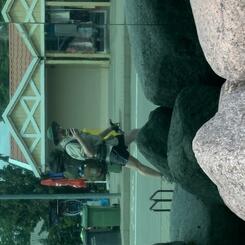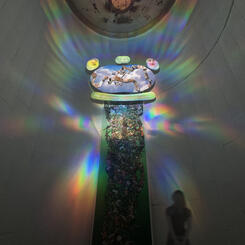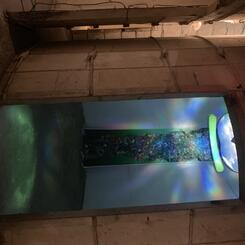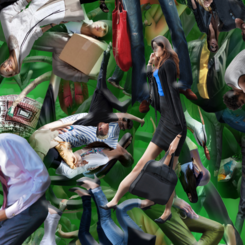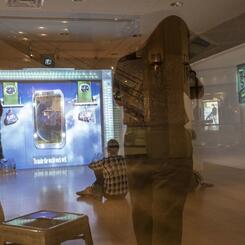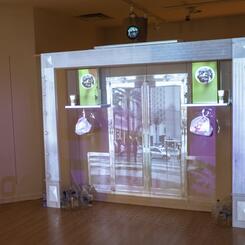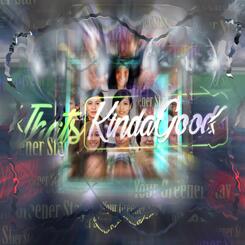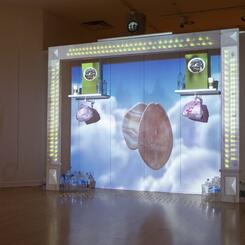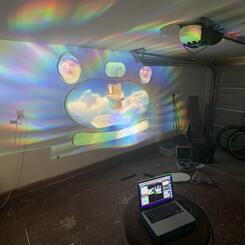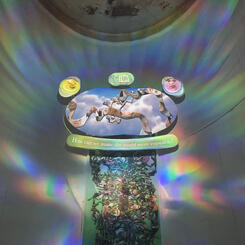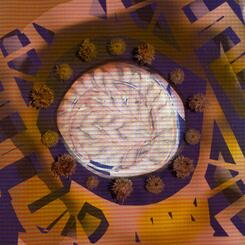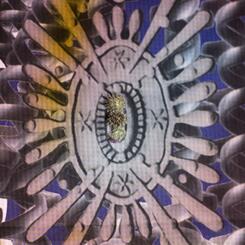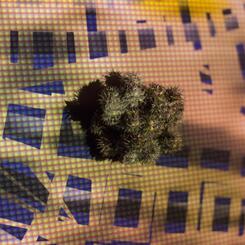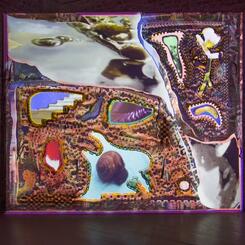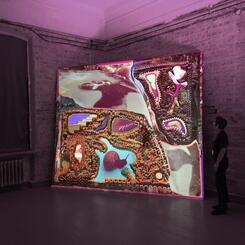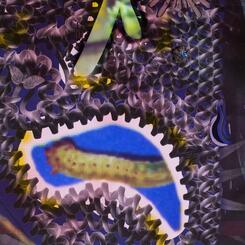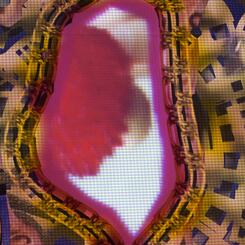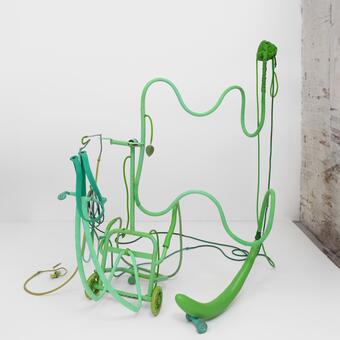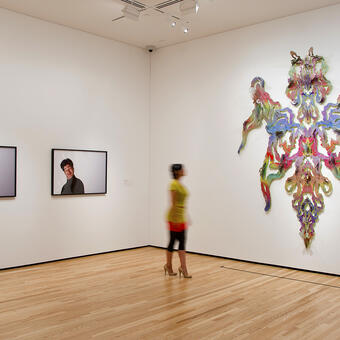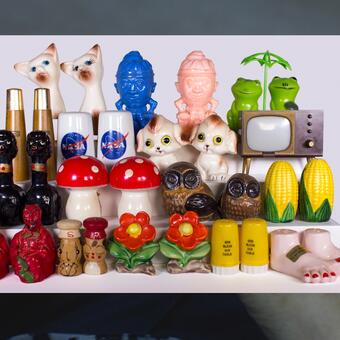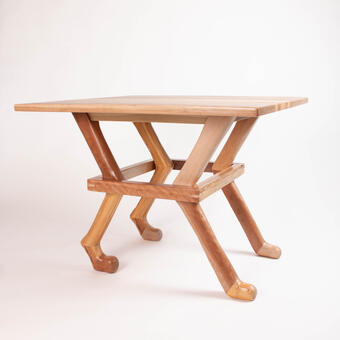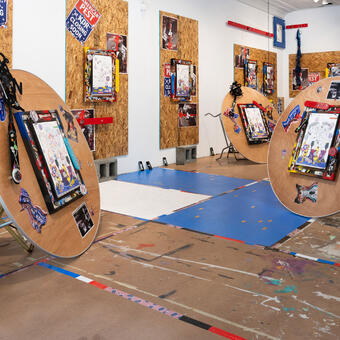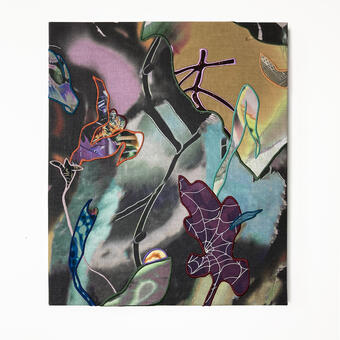Work samples
-
Skyyys™ 52-Channel Video at Fulton Center NYC
Dave Greber
Commissioned by MTA Arts & Design
52-channel Video Installation July 2018 through March 2019
Fulton Center, Manhattan, NYC -
Dave Greber Motion Graphics Reel
featuring highlights of recent digitally-based projects
made using after effects, blender, premiere, photoshop, p5.js, mad-mapper, AR & VR appsmusic: Orange 2 by Macula Dog
-
The Casebearer_2C
Segment 2C of The Casebearer 2.0 (full-length 9:59 min).
A modular retelling of the lifecycle of a plaster bagworm. Created as a part of A Structure Envisioned for Changing Circumstances residency, curated by Maija Rudovska. An exchange between art-wrokers from the US, the Baltic countries and Norway.
-
Pothole Geodessia
2018
Dave Greber and Sophia Belkin
12' x 10'
Video projection on inkjet-printed polyester, found artifacts, thistles
Collaboration featured as part of the Narva/Detroit symposium held at the Narva Art Residency, Estonia, in August, 2018.
About Dave

Dave Greber is an artist, educator, and consultant based in Baltimore. He creates experiences for the gallery and museum, as well as online platforms, manifested through digital media, sculptural installation, and social/environmental interventions.
He received a BA from Temple University and an MFA in Digital Media from Tulane University. He began exhibiting as a member of the New Orleans–based collective The Front. His work has been featured in Crystal Bridges’ State of the Art,… more
Glimmerloom
Dave Greber and Sophia Belkin
September 6 – October 11, 2024
Current Space, Baltimore, MD
Supported by a Professional Development Grant for adjunct faculty from the Center for Innovation, Research, and Creativity in the Arts (CIRCA) at UMBC.
On Dave Greber and Sophia Belkin’s “Glimmerloom”
by Tommy Doyle
John Bernhardt Smith, an American professor of entomology, is credited with having developed the glass lidded box that many are familiar with today as the preferred way to display insect collections. He developed the standardization of such boxes with his father, a cabinet maker, during his time as assistant curator of insects at the National Museum of Natural History (known then as the National Museum of Washington). They are still known as Schmidt or Schmitt boxes, as Smith had adopted the anglicized version of his family name.
The work Glimmerloom by Dave Greber and Sophia Belkin first appears similar to a Schmidt/Schmitt box; a collection of three-dimensional, creature-like shapes laid flat on a two-dimensional service. However, the work defiantly escapes comparison by presenting itself moving, fluid, and alive. Unlike an entomologist’s collection or a Renaissance “cabinet of curiosities” or “wonder room” (Kunstkammer, Wunderkammer), Glimmerloom contains no boundaries or barriers that seek to categorize, chronicle, or define objects within a boundary. The sculptural elements are instead more like growths that emerge from a swirling painted backdrop. It’s an anti-cabinet; a collection that was never intended to be owned; John Carpenter’s 1982 film “The Thing”, an alien matter that is foreign, but also in us.
There is a practice in entomology that requires a “killing jar” to kill a captured insect with minimal damage, but the Glimmerloom contains no reference to death, capture, or stillness. It’s all sustaining, none asking for alive. It doesn’t emulate the type of oddities popularized by retail stores like San Francisco’s Paxton’s Gate (or Baltimore’s own, Bazaar) that harken to the Victorian obsession with dying. The tension that that makes Glimmerloom a robust experience over a visual replica of a cabinet of curiosities or Schmitt/Schmidt box is that the things that are pinned down are not restricted by their placement, they move with the aid of projections and motors and wind, they’re kinetic, as much machine as they are biological. They didn’t die in order to be presented, they in fact seem to not just live, but thrive as their wings are pinned to a surface.
The German entomologist Maria Sybilla Merian was born in 1646 to a father who was an engraver and publisher and encouraged in childhood to paint and draw by a stepfather who was a flower and still life painter. She gained access to the gardens of wealthy citizens through work as a drawing instructor for their children and documented and collected insects during this time. By somewhat masquerading as as naturalist painter and illustrator, she was able to document the lifecycles of butterflies and the development of frogs, which produced detailed studies that dispelled the idea of spontaneous generation, the belief that insects were “born of mud” and furthermore deemed “beasts of the devil”. The starkness and frankness present in Merian’s work is not anything akin to what is presented by Belkin and Greber, but there is a similarity in the decorative flourishes, exaggerated forms, and fiction that exists in creating both abstraction and cramming all lifecycles of a single animal into a single image. Merian too may have not actually observed with her own eyes some of the things that she was “documenting”, which is its own type of “science fiction”.
The wedding of the machine to the organic is poignant now for the explosion of artificial intelligence, which actually is a tool utilized by Greber and Belkin (and especially in Greber’s own individual practice). There’s a historical tendency for creatives to imagine what this looks like in a gothic/steampunk fashion, human inventiveness and science bringing the capability to reanimate (think Mary Shelley’s “Frankenstein”, Yorgos Lanthimos “Poor Things”) or in a science fiction style, skewing dystopian of course (“Do Robots Dream of Electric Sheep” and it’s descendent “Blade Runner” or “Terminator”). However, dystopia and horror are the antithesis of the Glimmerloom. For all of their uneasiness and uncanny movements, they breathe and glow with a vibrancy and pastel-like calmness. The robots aren’t taking over, the monster isn’t coming to your village - it sits before you, happy to exist, minding its own business. It inspires a specific type of affection, like observing a bird from a window as you work on a laptop, or hearing the rhythmic snoring of a dog that sits before a television. Existing with nature and technology side by side is an essential part of the contemporary human experience and it behooves us, it’s imperative, that we work to find the perfect balance there.
Another essential part of being alive is making meaning of it all, finding reason and rationale from things that are purely natural. It’s why we have myths and religion. The Victorian obsession with death that inspired the collection of post-mortem photos, death masks, and memento mori was a way to make tangible the realities of the high mortality rate. But collections, knowledge, and understanding, new or old, are noble and necessary but ultimately futile. We burned the Library of Alexandria but the waves of the Mediterranean continued to lap at its ruins, whether or not we knew the reason for the wind and storms that caused them. Glimmerloom, as an anti-collection in an anti-cabinet, doesn’t help us to categorize what we know or put definitions and borders around things. It isn’t an invitation to understanding because it isn’t inviting us to do anything at all; it just wants to be. And while viewing it can inspire a series of thoughts and ponderings, it sighs and wriggles and floats like plankton regardless of whether or not we inhabit its space. Live and let live.
We take our phones into the wilderness with us. After all, isn’t technology an extension of being human, divine, and perfect as conceived by the/a God(s)? Scientific and technological advances are byproducts of our natural will to live, survive, and thrive. Furthermore, explorations into the possibility of interplanetary travel were partially inspired by H.G. Wells, Jules Verne, and Russian Cosmism. There’s a very human innate desire to extend ourselves infinitely in all directions, and that desire inspires works of creative fiction and “real” scientific inquiry all at once. For all of our efforts, science is a mythology; it’s an interpretation of what is laid before us, what glimmers in the loom, a tapestry in progress. It’s as much transcendental as it is “Twilight Zone”. “I Sing the Body Electric”; so do you.
-
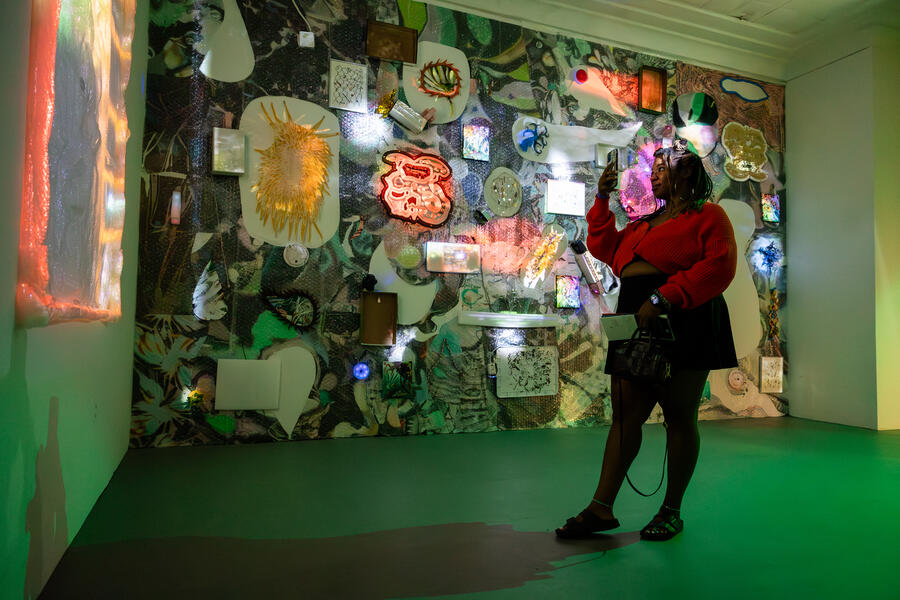 Glimmerloom Install Bromo Artwalk
Glimmerloom Install Bromo Artwalk -
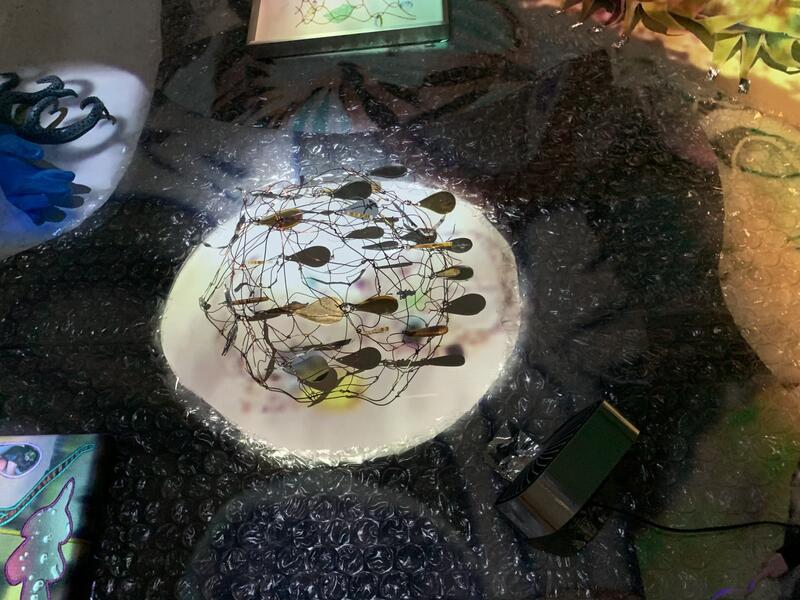 Glimmerloom (detail 3)
Glimmerloom (detail 3)temporal video projected on a wire and acrylic sculpture
-
Glimmerloom
video-mapped projection from Glimmerloom
-
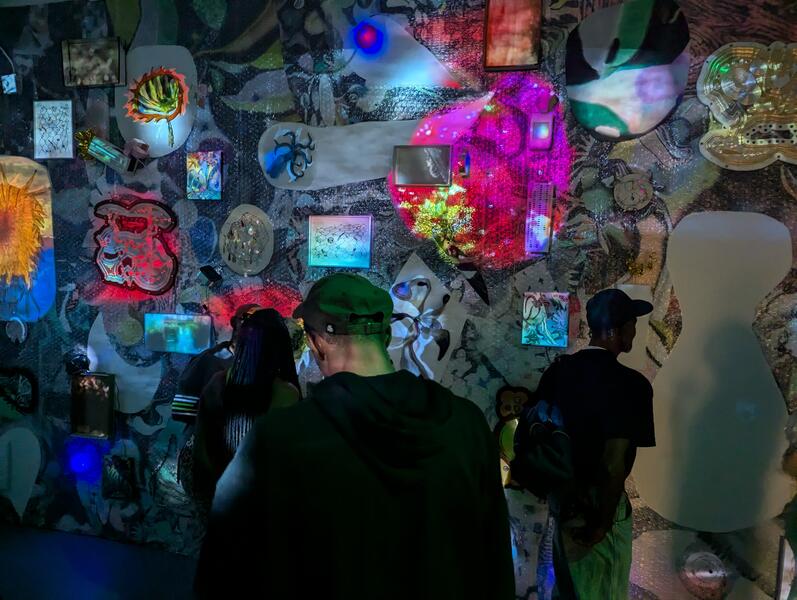 Glimmerloom (install 3)
Glimmerloom (install 3)Photo by Michael Benevento
-
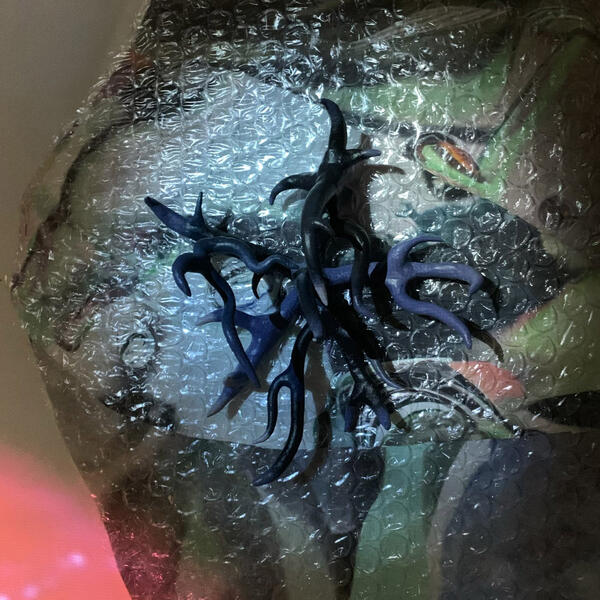 Glimmerloom (detail 2)
Glimmerloom (detail 2)plaster and bubble wrap on inkjet print on canvas
-
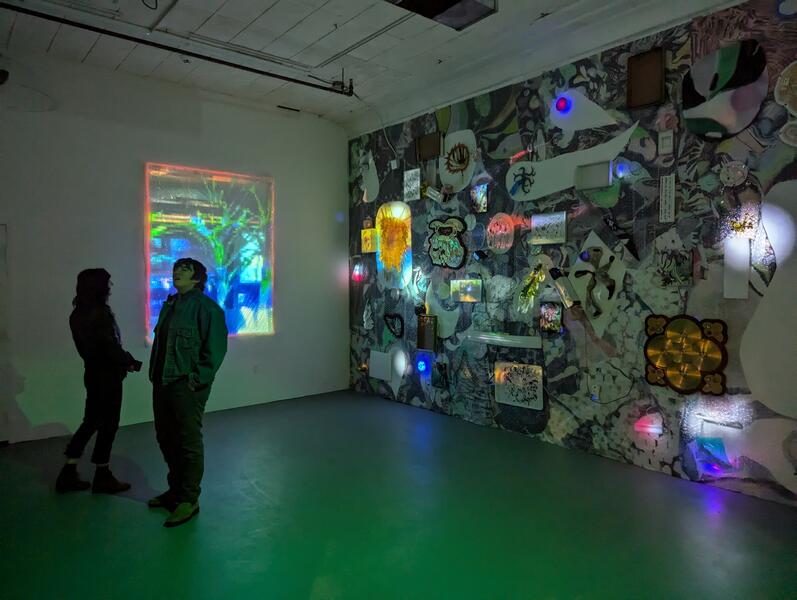 Glimmerloom (install 1)
Glimmerloom (install 1)Photo by Michael Benevento
-
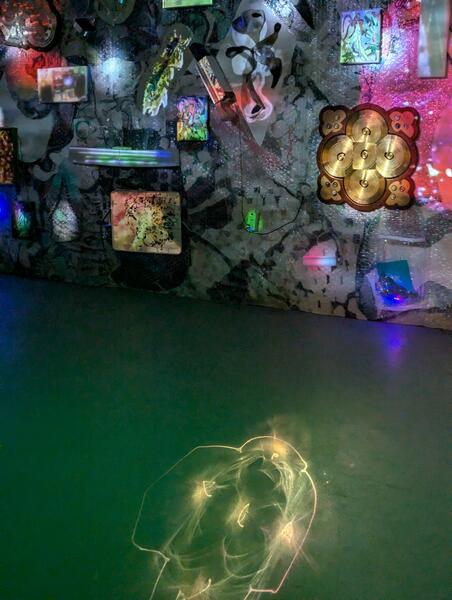 Glimmerloom (detail 1)
Glimmerloom (detail 1)Photo by Michael Benevento
-
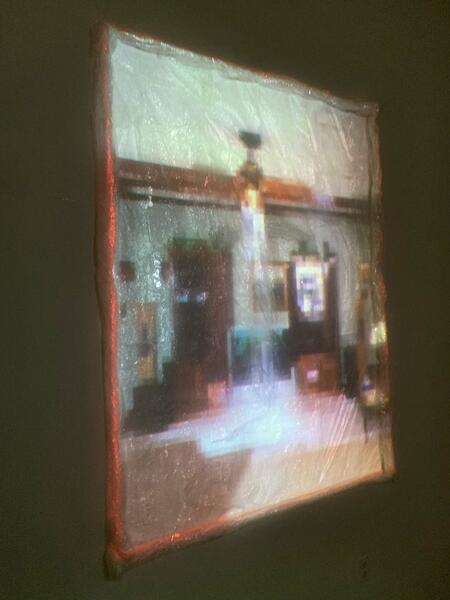 Glimmerloom (detail 1)
Glimmerloom (detail 1)Detail of a 4 min video projected onto bubble wrap
-
Glimmerloom Bubblewrap Cabinet
Riffing on the cabinet of curiosities theme, I made this piece from images of 80's and 90's stereo cabinets, for sale on facebook marketplace. I "haunted" them with AI elemental interventions, various plagues: floods, insects, ooze, fire, lightning, etc.
This piece was projected onto a bubble-wrap screen in the Glimmerloom installation at Current Space, Current Space, Baltimore, MD
-
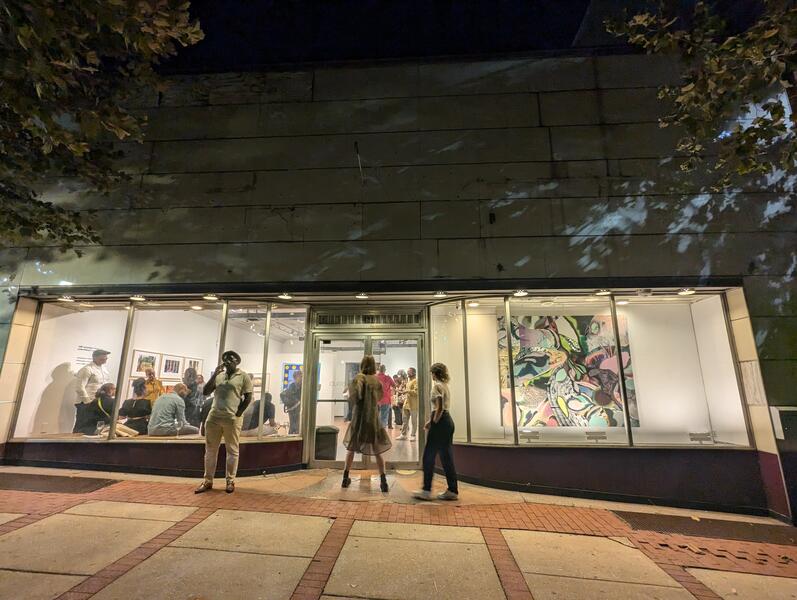 Glimmerloom (establishing shot)
Glimmerloom (establishing shot)the exterior of Current Space
Photo by Michael Benevento
You Are Giving Universe
You Are Giving Universe (YAGU) starts as a set of short vertical loops that borrow TikTok AI how-to pacing while the “lesson” never fully arrives. Literally, how to eliminate all human/thought from your workflow/lifeflow. Symbols replace names, the format promises utility and delivers something closer to prayer or glitch-lit/TranslateGate nonsense.
The videos are the entry layer to the project. The larger work is interactive: viewers comment a word, and I respond with a matching “drop,” turning engagement into a transactional ritual. It deliberately echoes Ponzi/MLM mechanics (keys, access, rewards, recruitment), but strips out the product so the exchange itself becomes the content.
YAGU can also become embodied as a multi-channel installation, like the iteration shown at Sculpture Month Houston. In that form, the drops stop reading as “content” and start behaving like an object you encounter. The vertical screen, the loop, and the spill of light into the room turn the tutorial cadence into a viewing protocol. Your movement replaces scrolling, and your time in front of the loop becomes the transaction.
In parallel, YAGU is developing as a browser-based version (in progress) that treats the project as a navigable interface. The drops become modular units you unlock, sequence, and move through, extending the same call-and-response logic into a longer, site-shaped experience.
Some context : The Best Way to Exit
By Tommy Doyle
“It probably started to bubble up mostly during the COVID-19 pandemic. However, like almost all trends and shifts in the last few years, the pandemic did not create it, but simply accelerated its growth. It looks like 19 year olds spending quarantine learning how to make money from drop shipping. It looks like remote work creating job-stacking, side hustles, and passionateless money-making endeavors. It looks like MLMs, recruiting via gorgeous influencers on Instagram, less concerned about the athleisure or the gummies or the flat tummy tea and more interested in the vibe, the aura, of the buyer/seller (they are one in the same, at times). It looks like hustle culture, YouTube ads telling you the quickest way to build a business (any business, no matter), LinkedIn posts about exiting, always exiting, only exiting (how many figures, how big of an exit?), never starting, never doing, only leaving. It’s AI your business, automate your business, then sell your business, leave your business, end the business, faster than it was started. The product, the process, the vision, the mission, the goals - those are irrelevant.
It’s a frictionless business. It is the most simple of economics: put almost nothing in, gain a massive return. It’s the only way to hope to compete with rising inequality and massive wealth disparity. The world is fast and complicated - the sense is that we should not be slowed down by any of the concerns that business could present. In this way, the ideal business is not predicated on fixing any problem or providing any great invention; the ideal business is just lightning fast, lubed up, ready to go. No foreplay, no cuddle afterwards, only penetration. It’s majestic, it's masochistic, it’s masculine. It looks like fun because it is a sport, an aggressive one. It looks like America, because it’s what we want to look like.
Passion is fickle, ideas are too easily stolen or replicated, employees are a burden, customers are a means to an end, brands change. Money is forever - after all, have you ever met a dollar you didn’t like?”
-
You Are Giving Universe (YAGU) Vignettes 1-5 install loop
This video presents the first five vignettes from YAGU, a larger series of silent, ad-formal loops. Each vignette borrows the cadence of ads and TikTok tutorials on removing all humans from the creative process (short arcs, clear steps) to remove the product, buyer, or purpose. What remains are poetic “anti-ads”: human figures as vessels, AI-generated surfaces that reference commerce and mysticism.
-
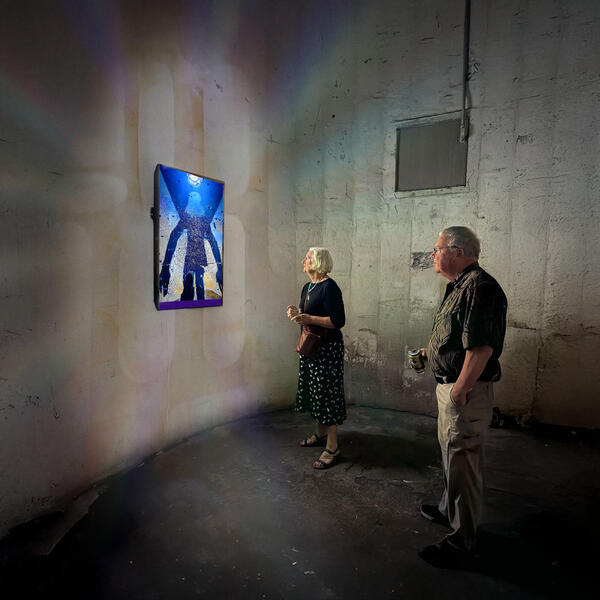 YAGU | Installation at Sculpture Month Houston
YAGU | Installation at Sculpture Month Houston2-channel installation
4:26 min
Vertical Monitor, Projection, Prism
Unique Installation at Sculpture Month Houston 2025
-
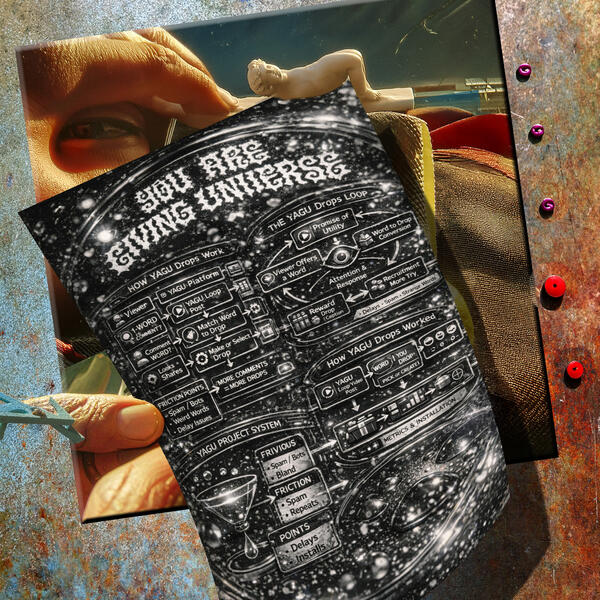 YAGU_feedback_loop copy.jpg
YAGU_feedback_loop copy.jpgA schematic for YAGU’s exchange structure: participation enters as a one-word offering, and the project returns a matched drop, converting attention into a ritualized transaction. The diagram lays out the loop, the bottlenecks, and the plans for the system evolution into an installation and browser-based format.
2026
font: CAMBRIAN ROUND by Andy Li -
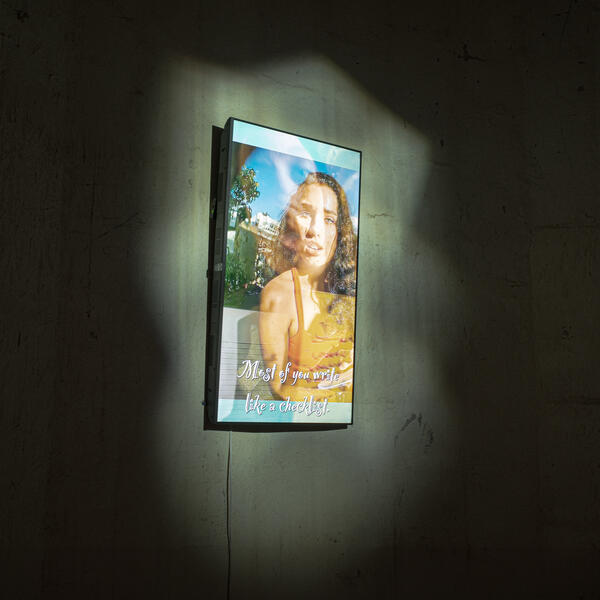 YAGU | Installation at Sculpture Month Houston 4
YAGU | Installation at Sculpture Month Houston 42-channel installation
4:26 min
Vertical Monitor, Projection, prism
Unique Installation at Sculpture Month Houston 2025
-
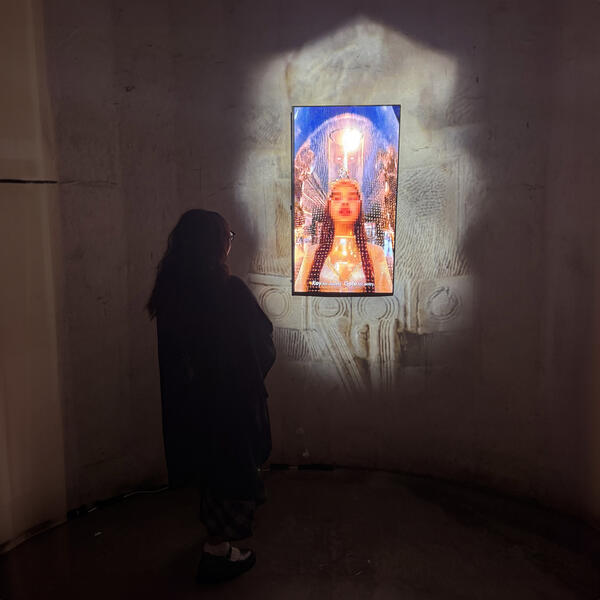 YAGU | Installation at Sculpture Month Houston 2
YAGU | Installation at Sculpture Month Houston 22-channel installation
4:26 min
Vertical Monitor, Projection, prism
Unique Installation at Sculpture Month Houston 2025
-
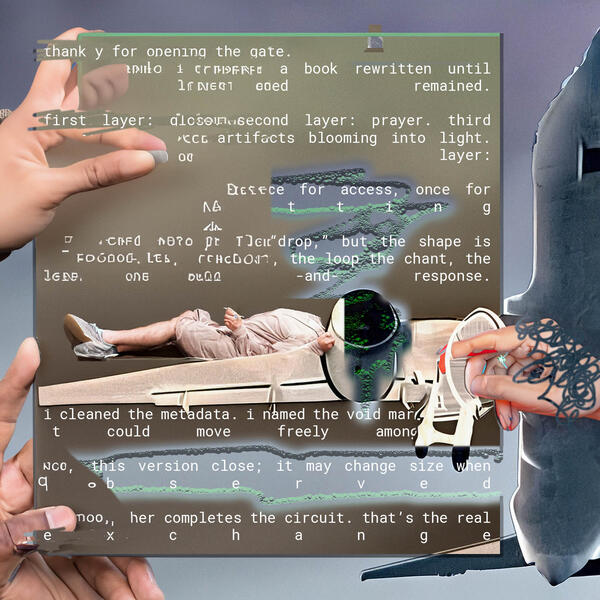 YAGU (Drop 5)
YAGU (Drop 5)YAGU drops are keyword-triggered replies: viewers comment a word, and I return a matching micro-video as a transactional “gift” that turns engagement into a ritual exchange.
This was the Drop for the 5th video, released 10/28/25 -
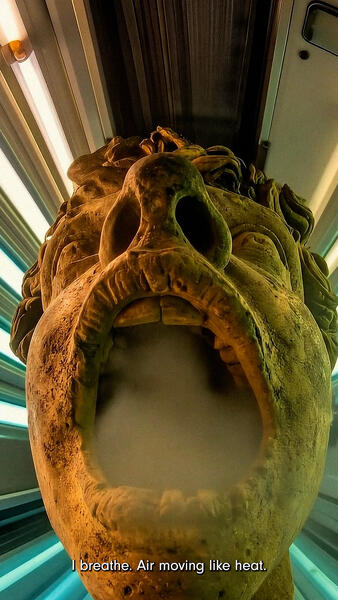 YAGU Screenshot 1
YAGU Screenshot 1"I breathe. Air moving like heat."
YAGU Screenshot 1
2025 -
 YAGU Screenshot 2
YAGU Screenshot 2Video still from a social-media-driven work where viewers comment keywords and receive a matched “drop” in response. Digital video, vertical loop.
2025
-
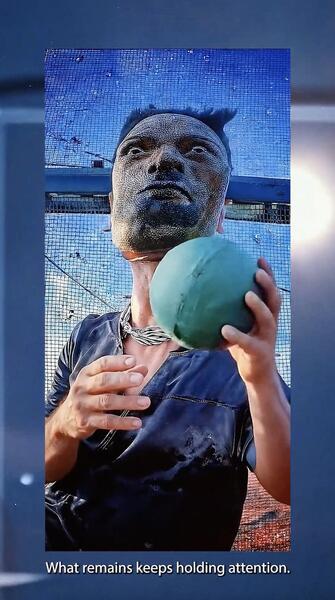 YAGU Screenshot 3
YAGU Screenshot 3Video still from a social-media-driven work where viewers comment keywords and receive a matched “drop” in response. Digital video, vertical loop.
2025 -
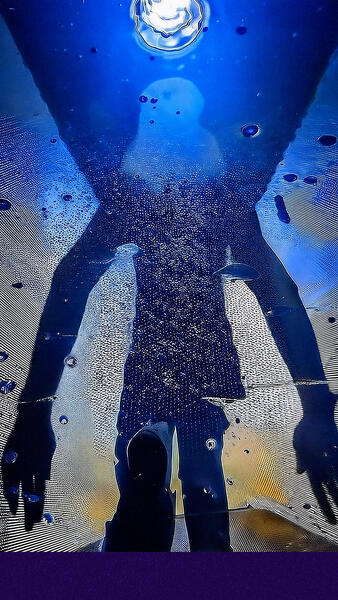 YAGU Screenshot 4
YAGU Screenshot 4Video still from a social-media-driven work where viewers comment keywords and receive a matched “drop” in response. Digital video, vertical loop.
2025
Skyyys™
52-Channel Video Installation
2 min duration
Fulton Center & Dey Street Concourse
Manhattan, NYC
July 2018 through March 2019
Commissioned by MTA Arts & Design
Artist Dave Greber’s Skyyys™is the most recent iteration of his vibrant, digital abstractions created from recognizable, colorful kinetic objects, such as balloons, bouncing balls, and stuffed animals. Skyyys™playfully mimics the persistent activity and change that defines our material world and transit experiences. The piece references and remixes the distinct, but convergent, forces between virtual media streams and our infinitely inventive minds, which simultaneously inhabit the same time and space. The tidal pace, whimsical imagery, and prismatic palette of Skyyys™creates harmonious visual-music that complements the pace of commuters at Fulton center, a likewise kaleidoscopic, liminal space, in the heart of visually diverse New York City.
Greber’s immersive 52-channel digital animation can be seen for two minutes at the top of each hour in the Fulton Center complex and the Dey Street pedestrian tunnel that connects to the R line and the World Trade Center PATH station. The work will be on view until fall 2018. The work is presented by MTA Arts & Design with technical support from Westfield Properties and ANC Sports.
Skyyys™ (2018) © Dave Greber, Fulton Center. Commissioned by MTA Arts & Design.
-
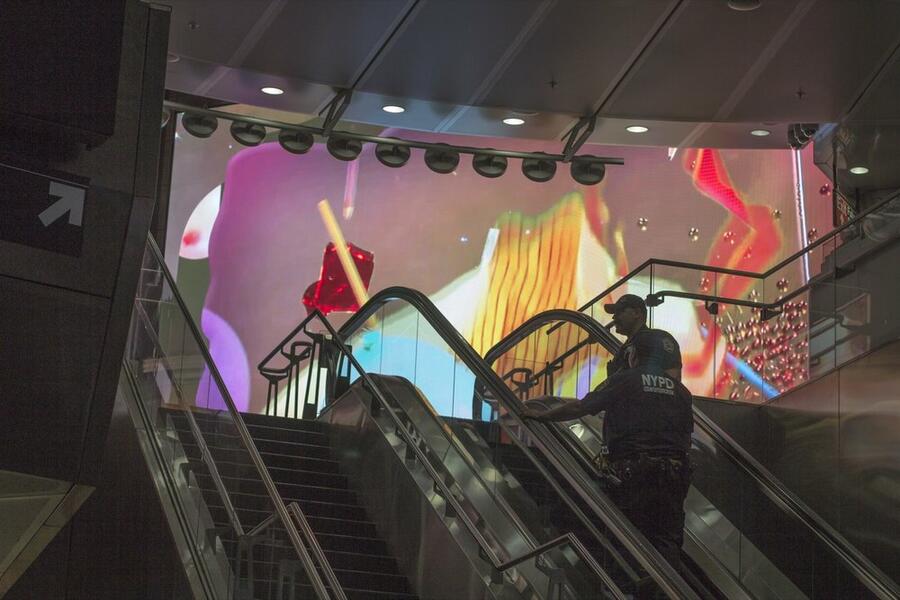 Skyyys_02
Skyyys_02Skyyys™ (2018) © Dave Greber, Fulton Center. Commissioned by MTA Arts & Design. Photo: Dave Greber
-
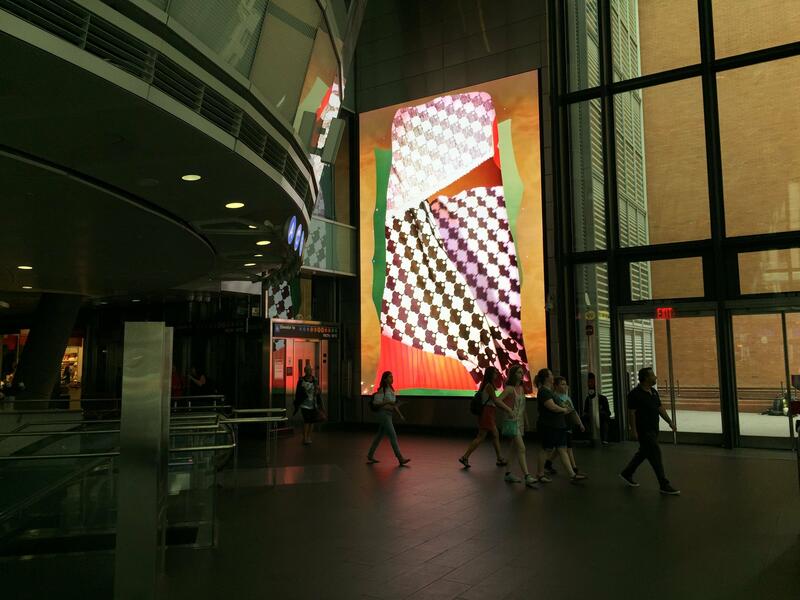 Skyyys™ vertical monitor
Skyyys™ vertical monitorSkyyys™ (2018) © Dave Greber, Fulton Center. Commissioned by MTA Arts & Design. Photo: Tamar Steinberger.
-
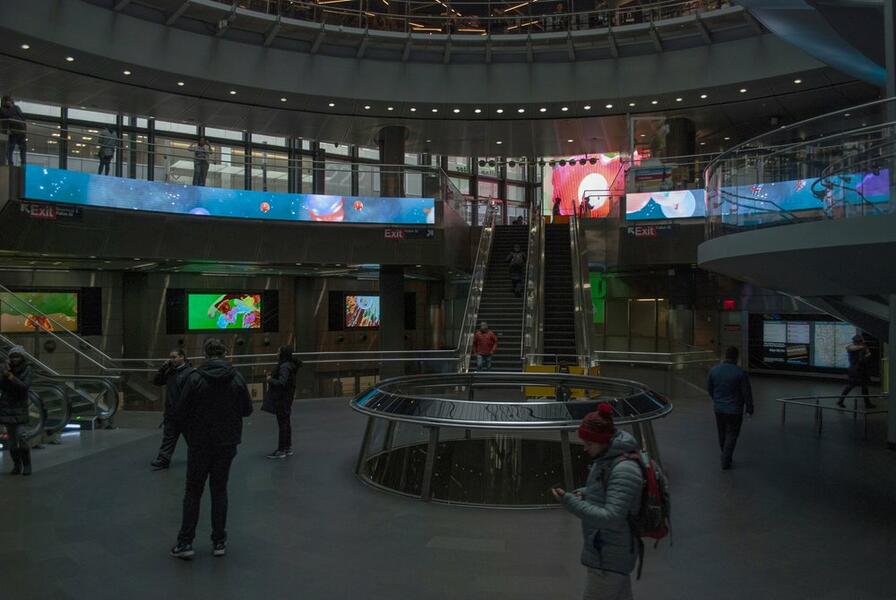 Skyyyys_09
Skyyyys_09Skyyys™ (2018) © Dave Greber, Fulton Center. Commissioned by MTA Arts & Design. Photo: Tamar Steinberger.
-
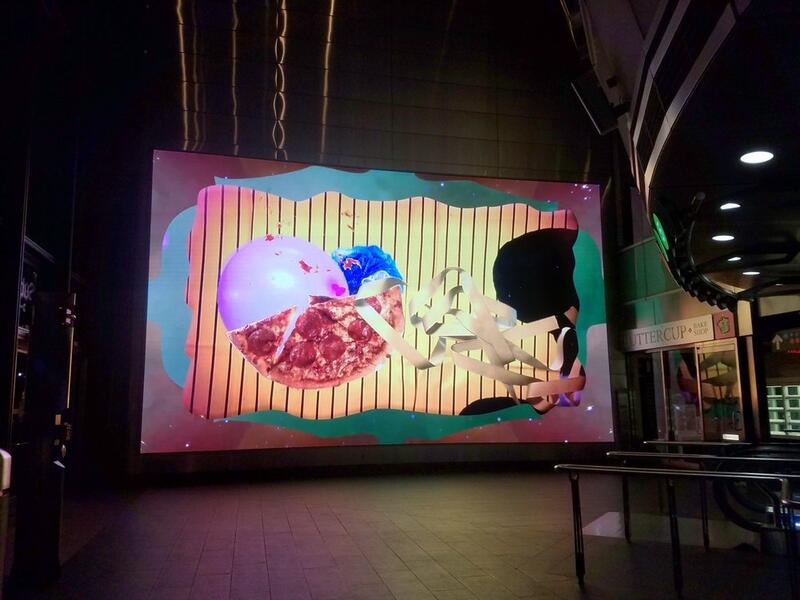 Skyyys_06
Skyyys_06Skyyys™ (2018) © Dave Greber, Fulton Center. Commissioned by MTA Arts & Design. Photo: Dave Greber
-
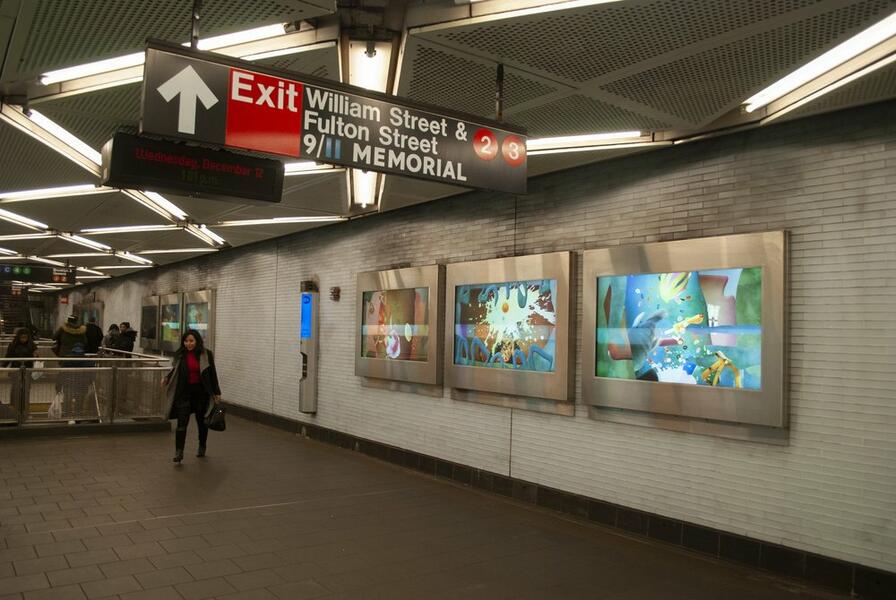 Skyyys_04
Skyyys_04Skyyys™ (2018) © Dave Greber, Fulton Center. Commissioned by MTA Arts & Design. Photo: Tamar Steinberger.
-
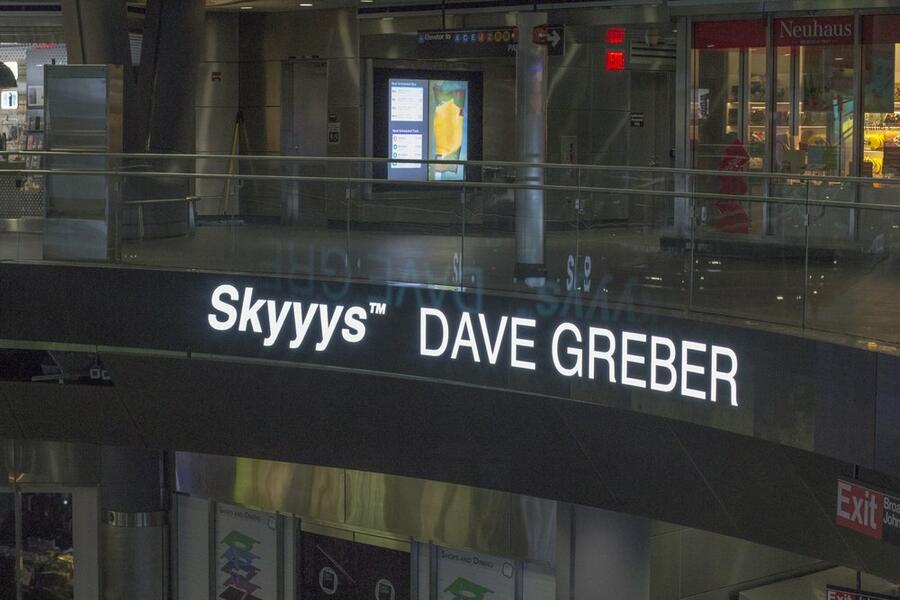 Skyyys_title
Skyyys_titleSkyyys™ (2018) © Dave Greber, Fulton Center. Commissioned by MTA Arts & Design. Photo: Tamar Steinberger.
-
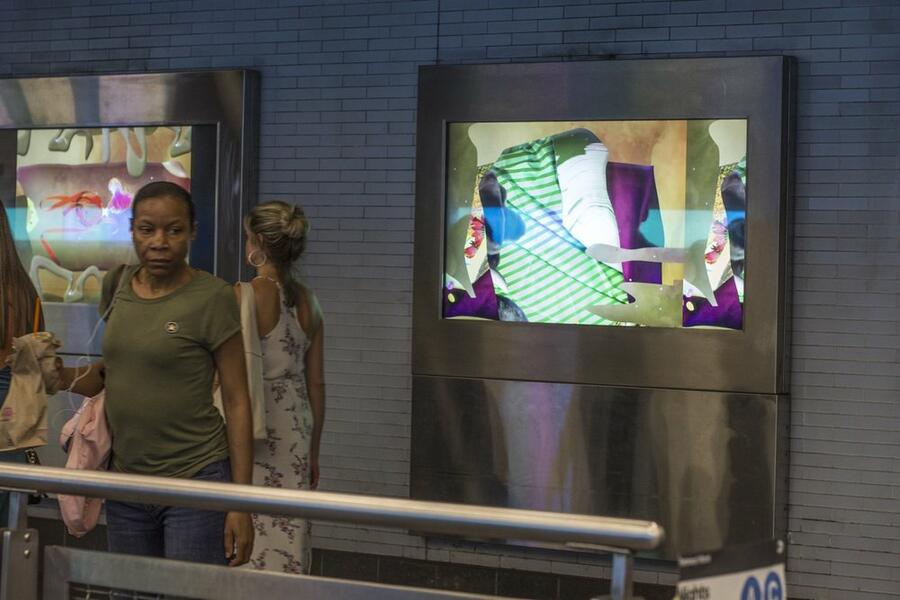 Skyyys™ 01
Skyyys™ 01Skyyys™ (2018) © Dave Greber, Fulton Center. Commissioned by MTA Arts & Design. Photo: Tamar Steinberger.
-
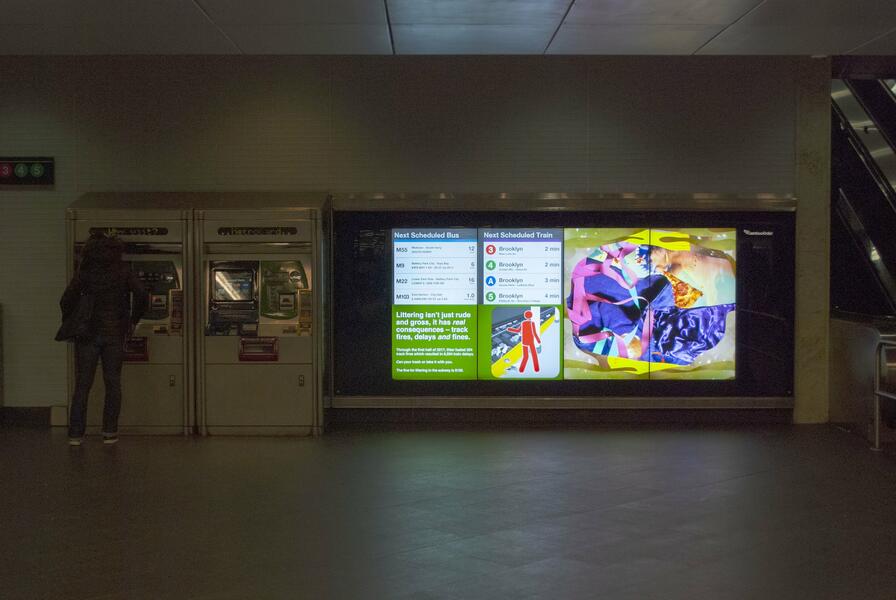 Skyyys™ Metro Card
Skyyys™ Metro CardSkyyys™ (2018) © Dave Greber, Fulton Center. Commissioned by MTA Arts & Design. Photo: Tamar Steinberger.
-
Skyyys at the Fulton Center
52-channel Video Installation
Commissioned by MTA Arts & Design
July 2018 through March 2019
Fulton Center, Manhattan, NYC -
Skyyys™ (excerpt)
This was the original source material that the Fulton Center installation was derived from. A small crew and I filmed this in my garage by throwing objects off of a ladder onto the surface of a 330-lb, 1-inch-thick piece of glass. Many of the objects were collected Mardi-Gras "throws" collected from parades.
HomeOffices
a web-based interactive solo exhibit
Interactive Link: Online Exhibit
The Call From Inside the Home Office: Dave Greber’s HomeOffices at Public Access Memories
by Emily Farranto
The 2020 pandemic lockdown left its mark on our collective psyche and changed the shape of certain corners of our lives. While many were suddenly out of work, others were forced to merge work and home lives, blurring temporal and spatial boundaries, turning tables into desks and small rooms into offices. When the lockdown ended, many jobs continued on a work-from- home or hybrid structure. Even those whose work lives were not directly upended by the pandemic, the employer assumption that workers are available outside work hours has been normalized. There is no consensus about whether the shift toward a work-from-home economy has done more harm than good for individuals and families. Dave Greber’s exhibition of interactive digital collages, HomeOffices, suggests there is something grotesque about this grafting of work and home, grotesque but laced with culture-deprecating humor.
Arriving at the online gallery, Public Access Memories, we find ourselves looking at the desktop of a home computer whose wallpaper is a picture of a desk on which sits a worn, softcover book titled Home Offices. Visitors select an emoji avatar. Other emojis may be floating about; these are other gallery-goers. As we mouse around the screen, images–a daisy, a pen, a yellow, rubber glove–appear and disappear under the cursor. We enter the exhibition at the bottom right corner and move through each image/installation this way like turning pages of a virtual book.
The works in HomeOffices are based on images from a 1984 look book of office furniture. The originating interiors dense and airless, dated and bizarre. Making the strange stranger, the artist added objects–some human or animal–to the scenes using AI. The image viewers encounter when they click into each space, is the final iteration of the collage. They can explore the images, which flicker and change revealing random-looking objects, which are the AI suggestions the artist dismissed. If you mouse over the globe on the desk, it becomes a basketball, then a cluster of balloons.
This haunted history of rejected versions is one of many ways the work is deeply layered. Avatars proceed though virtual rooms that can be understand as collages or spatially as virtual installations. An avatar, representing a whole person, moves through the space suggesting they are installations, but a binding seam passes vertically though some images, implying the rooms are two dimensional and we are looking in a book. Occasional objects appear to be placed on top of a page further confusing our viewpoint. Meanwhile, viewers access the exhibition from computers, most likely in their home space, possibly at a desk. This is the reality parfait the work creates, layering the viewer into its gaudy claustrophobia. In the unlikely event that a viewer feels underwhelmed, each installation-collage hosts an AI generated soundtrack related to the objects in the room and occasional pop-ups vie for our attention.
The pandemic hastened our adoption of communication technologies and drove our work lives into all hours of the day in some Philadelphia Experiment-type, mutated collapse of time and space. Humans hardly have the time to ask essential questions like, what are we working for? And, Can we mute the discomfort by redecorating our offices? The playfulness and humor in HomeOffices, consistent with the artist’s larger body of work, is funny-dark. The nightmare-like deformities, vagueness, and misinterpretations of AI not only generate appropriate imagery, but provide an apt metaphor of the zeitgeist. Is artificial intelligence cool or scary? Will it help or hurt us? Art is the sometimes-uncomfortable mirror of how we are living and what we value. Is working from home working for us? Greber’s HomeOffices does not answer these questions, but it suggests the call is coming from inside the house.
Credits
Programmer: Jenna deBoisblanc @jdeboi
Essay: Emily Farranto @thevillagedisco
Technician: Nathaniel Britton @natejbritto
Printer: Paper Machine @antenna.works
-
HomeOffices | Walkthru Sample
A screen-recording of the interactive web-based exhibit, HomeOffices.
The interactive exhibit can be visited here : Interactive Link
-
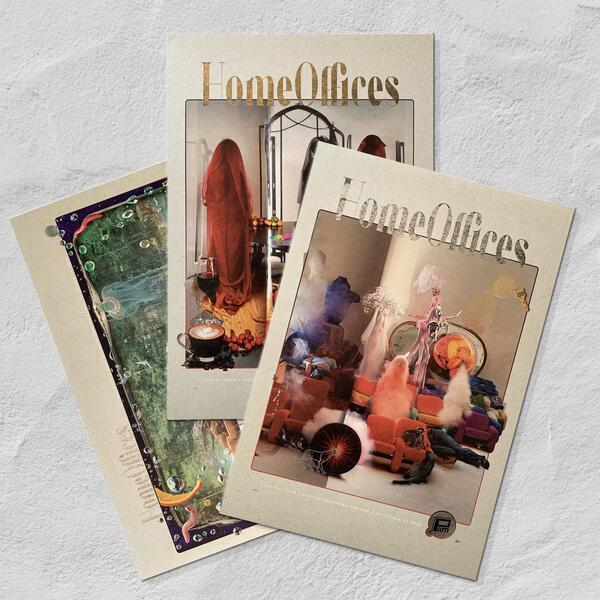 HO-poster_all_3.jpg
HO-poster_all_3.jpg13x19 inch digital full-color prints with silver or gold foil accents, released as part of the exhibition.
Limited Edition of 11 | signed and numbered by the artist.
Printed using a heated press process for the foil and white toner spot color foundation on Kraft Tone #100 chipboard cover paper.
Available for Purchasehttps://www.thesculpted.com/shop
-
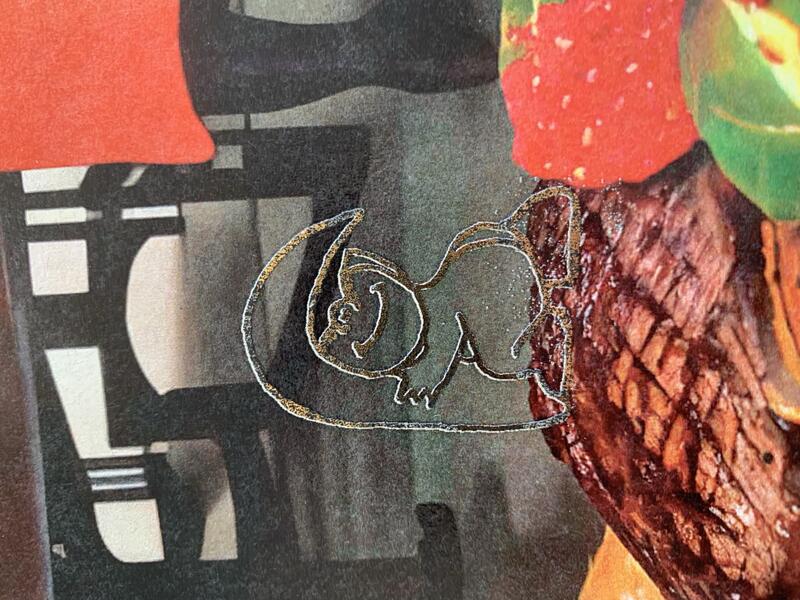 daveggreber_homeoffice_A_detail1.jpg
daveggreber_homeoffice_A_detail1.jpgdetail shot of HomeOffice poster A
13x19 inch digital full-color prints with silver or gold foil accents, released as part of the exhibition
Limited Edition of 11 | signed and numbered by the artist
Printed using a heated press process for the foil and white toner spot color foundation on Kraft Tone #100 chipboard cover paper.
-
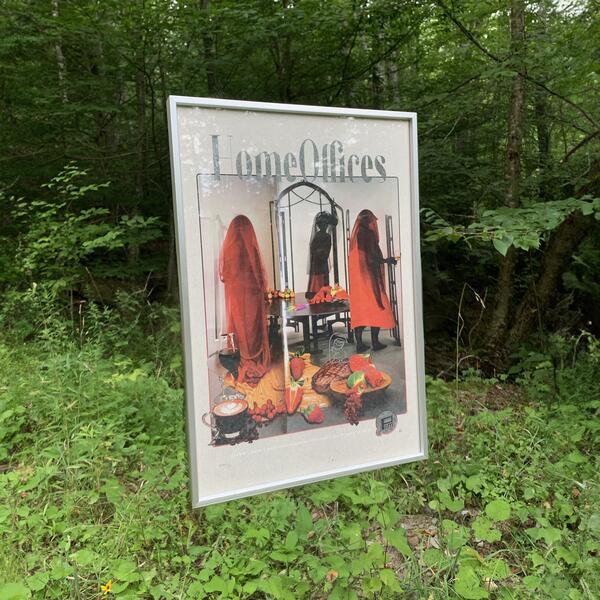 framed_poster_woods_A.jpg
framed_poster_woods_A.jpgA framed 13x19 inch digital full-color prints with silver or gold foil accents, released as part of the exhibition.
Limited Edition of 11 | signed and numbered by the artist.
Printed using a heated press process for the foil and white toner spot color foundation on Kraft Tone #100 chipboard cover paper.
Available for Purchasehttps://www.thesculpted.com/shop/p/9sbcy0tktpt6fdfimavw86uc9nta8d
-
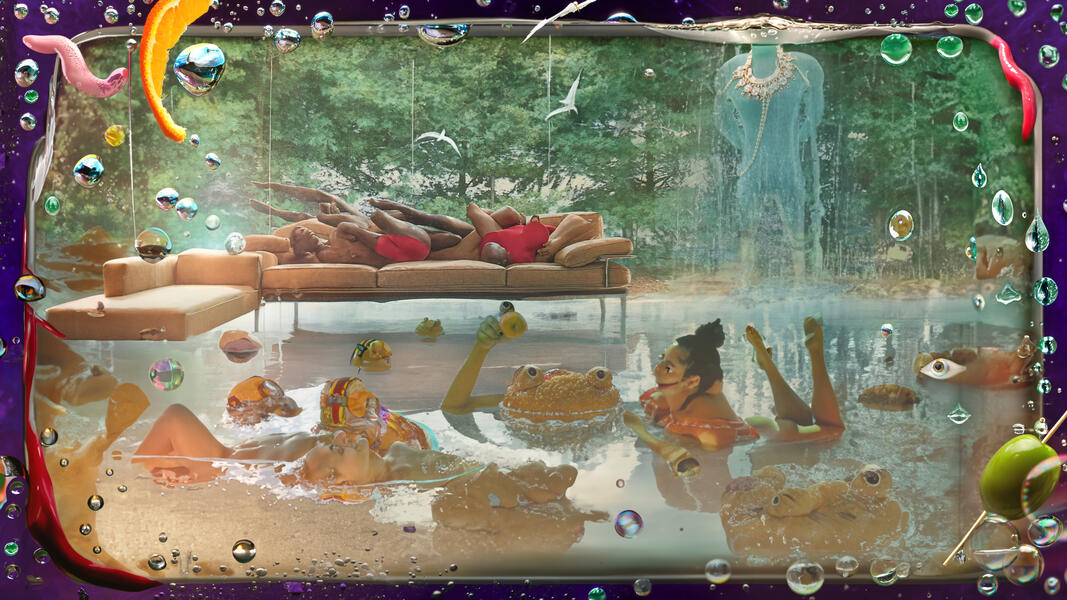 HomeOffice_17_spritz
HomeOffice_17_spritz7680 × 4320
Dave Greber
Generative Ps Interventions on Office Furniture
The Office Book Design Series (1984), 2023
series of limited edition jpegs -
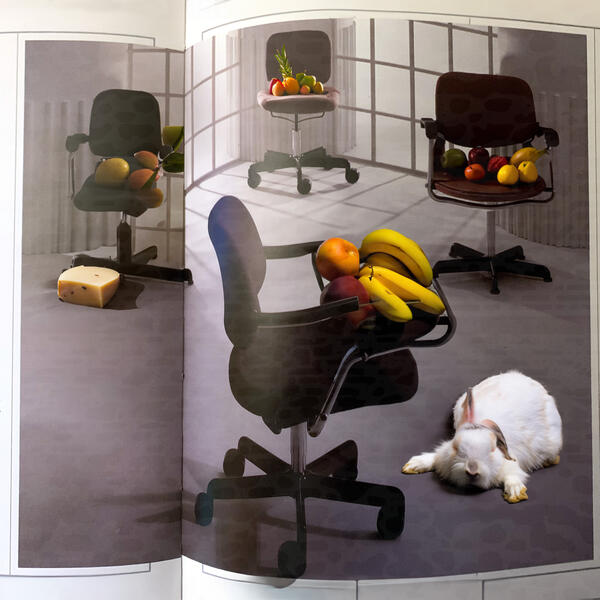 HomeOffice_01
HomeOffice_013102 × 3102
Dave Greber
Generative Ps Interventions on Office Furniture
The Office Book Design Series (1984), 2023
series of limited edition jpegs -
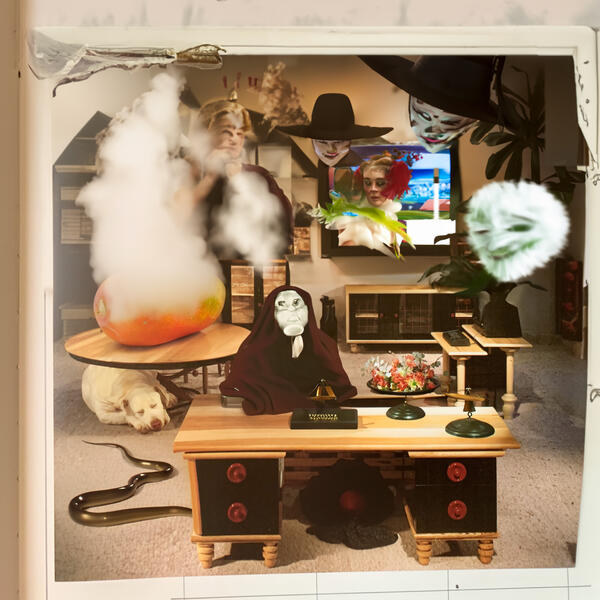 HomeOffice_13
HomeOffice_133995 × 3994
Dave Greber
Generative Ps Interventions on Office Furniture
The Office Book Design Series (1984), 2023
series of limited edition jpegs -
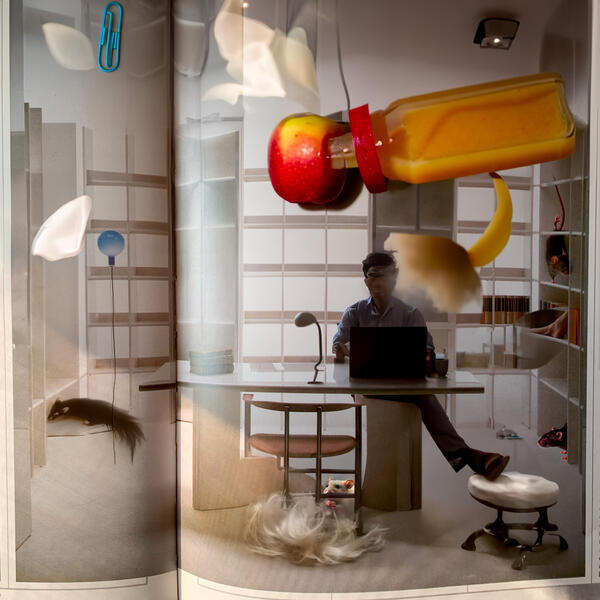 HomeOffice_15
HomeOffice_153186 × 3186
Dave Greber
Generative Ps Interventions on Office Furniture
The Office Book Design Series (1984), 2023
series of limited edition jpegs -
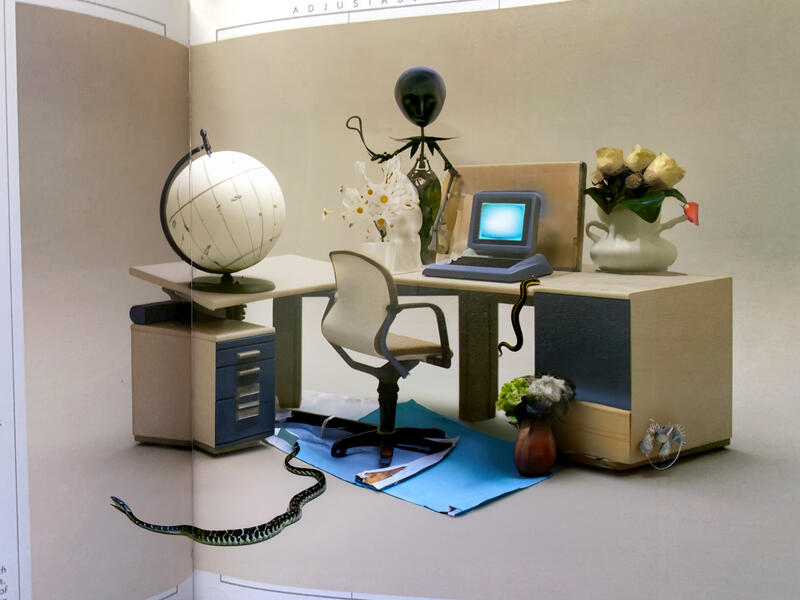 HomeOffice_02
HomeOffice_023889 × 2917
Dave Greber
Generative Ps Interventions on Office Furniture
The Office Book Design Series (1984), 2023
series of limited edition jpegs -
HomeOffices - Dave Greber's Artist Talk with Tulane University
Walkthru and Artist talk Dave Greber & Jenna deBoisblanc with Prof. Kevin Jones' Digital Arts Class, Tulane University 2024
The Casebearer 2.0
An epic poem in the form of an enigmatic educational video following the life-cycle of a Casebearer Moth. The language, voices, and (some) visuals were created in collaboration with artificial intelligence models. It has been featured in the US and Internationally, IRL and in VR.
Dave Greber
The Casebearer 2.0
2022
4K, 9:59 min
The Casebearer 1.0 was developed as a collaborative project by Cristina Molina and Dave Greber during A Structure Envisioned for Changing Circumstances online project, Curated by Maija Rudovska (Blind Carbon Copy) in close partnership with Amy Mackie (PARSE NOLA) and Tina Rigby Hanssen (Vestfold Art Center). They took inspiration from the highly adaptive species commonly known as the Bagworm or CaseBearer who creates a cocoon home for itself from whatever debris it finds. As artists who live in New Orleans, a city that faces coastal erosion and is threatened by sea level rise, the Bagworm serves as a model example of a resourceful nomad that acclimates itself to any given situation.
The Casebearer 2.0 is Greber's fork and expansion of the original pair of videos.
-
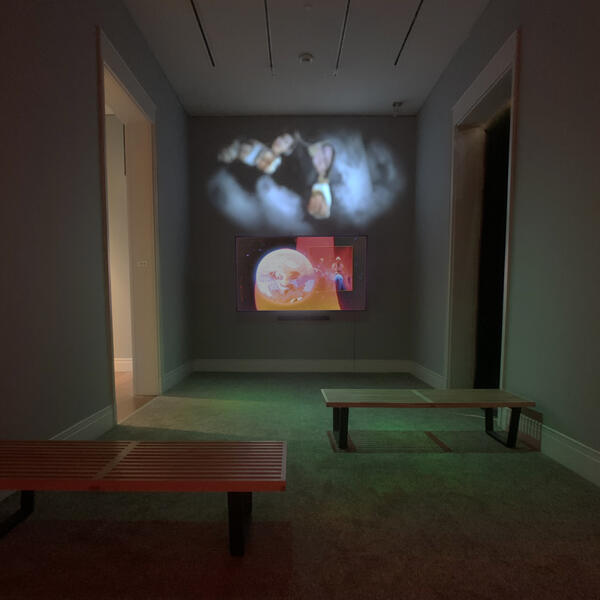 Casebearer Installation
Casebearer Installationshown installed in the Ogden Museum of Southern Art, 2022
-
The Casebearer 2.0
An epic poem in the form of an enigmatic educational video following the life-cycle of a Casebearer Moth. The language, voices, and (some) visuals were created in collaboration with artificial intelligence models.
Dave Greber
The Casebearer 2.0
2022
4K, 9:59 min -
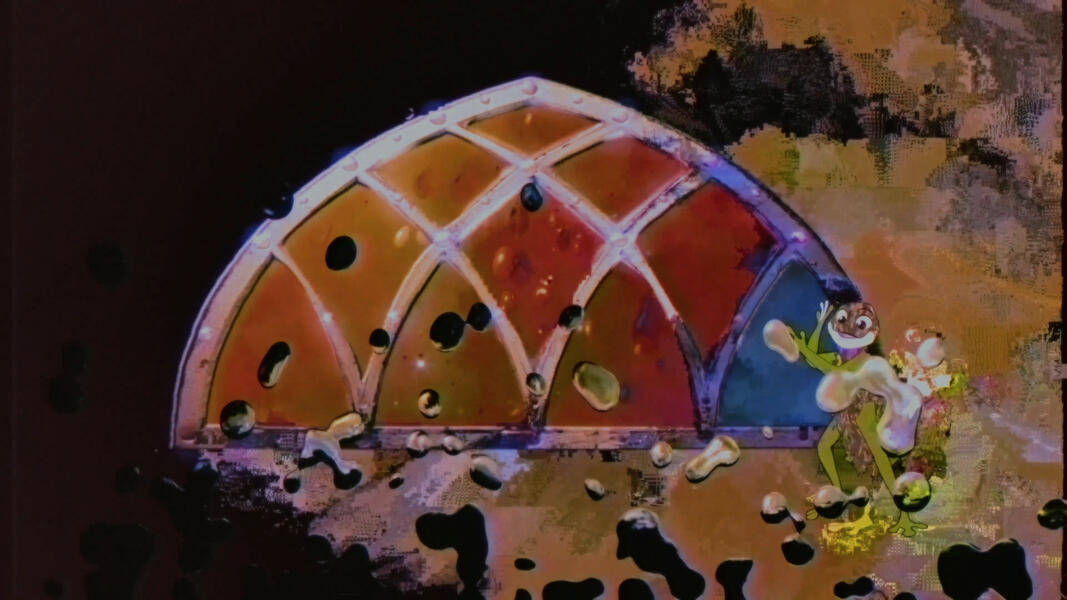 Casebearer Still 06
Casebearer Still 06Dave Greber
2022 -
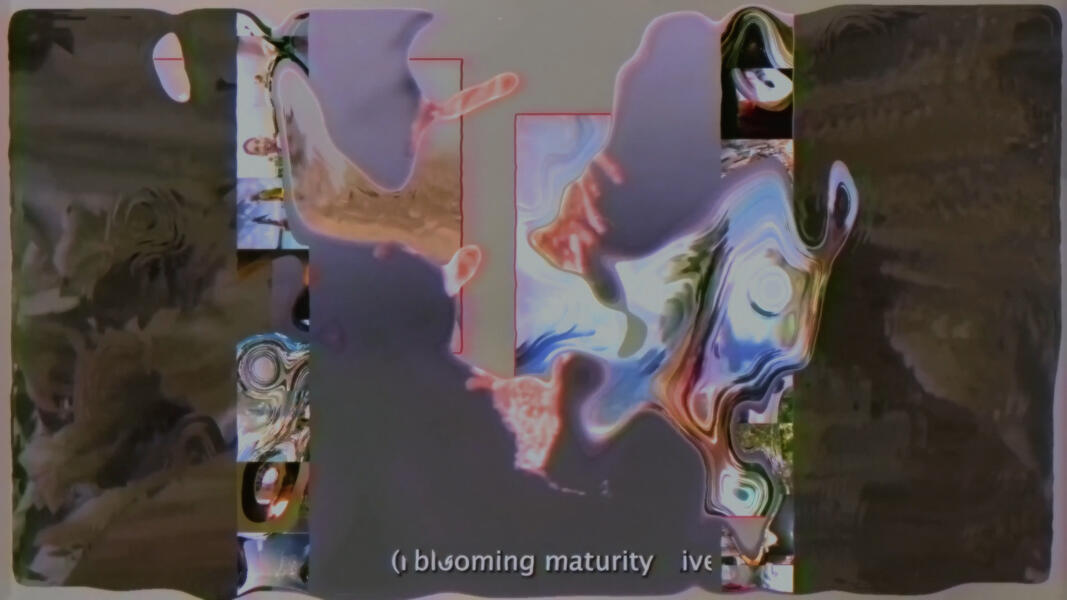 Casebearer Still 03
Casebearer Still 03Dave Greber
2022 -
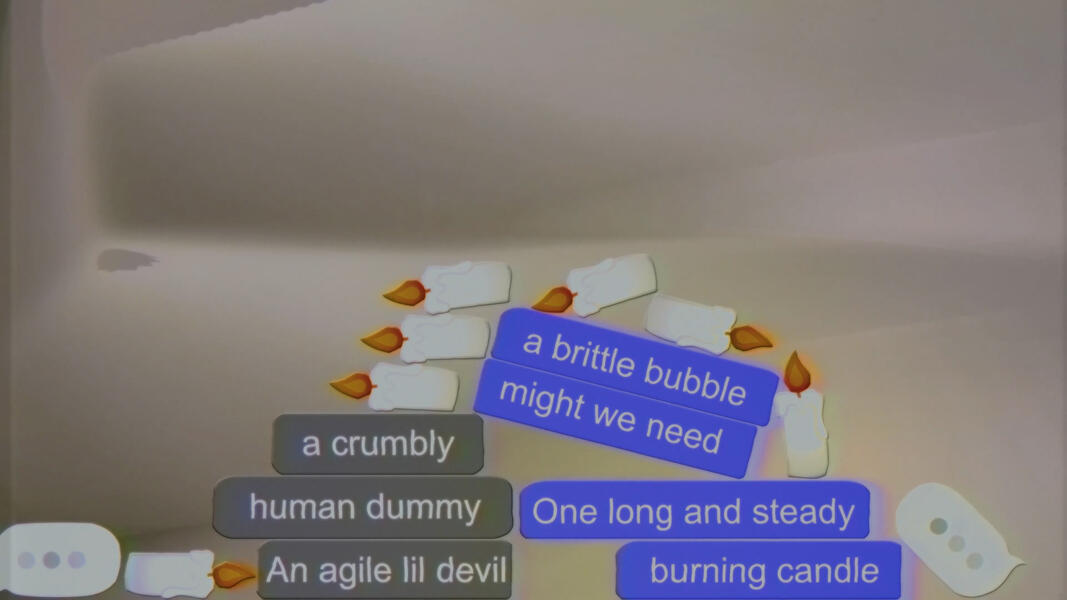 Casebearer Sill 02
Casebearer Sill 02Dave Greber
2022 -
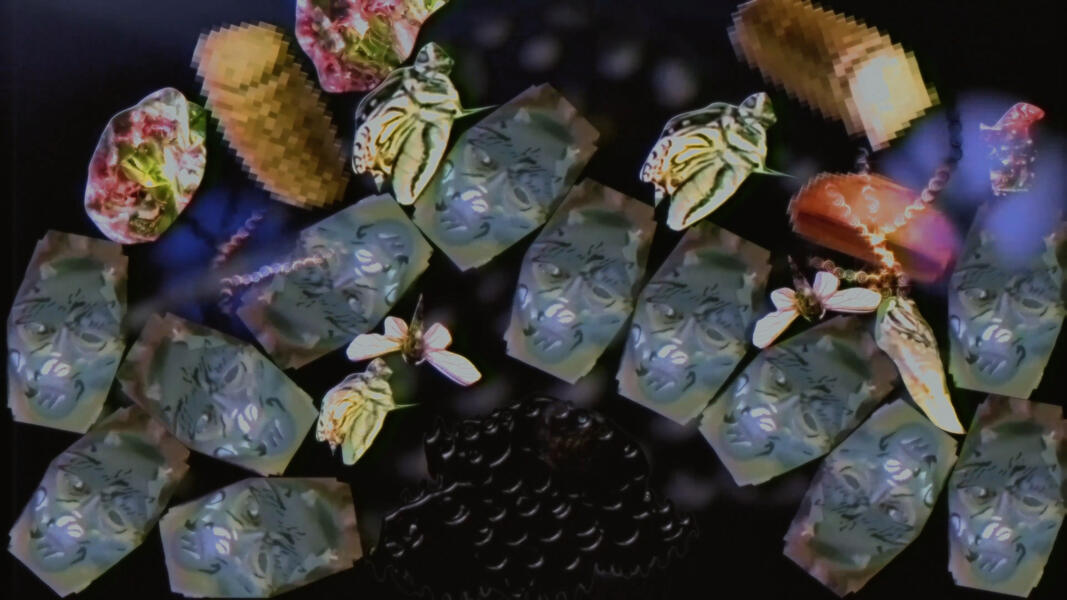 Casebearer Still 01
Casebearer Still 01Dave Greber
2022 -
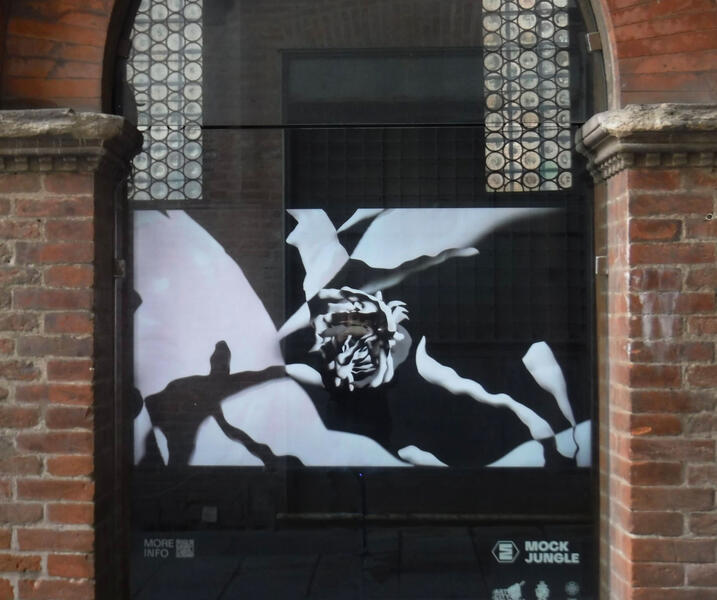 Casebearer 2.0 installed at Mock Jungle
Casebearer 2.0 installed at Mock JungleThe Casebearer 2.0
Dave Greber
Mock Jungle, Bologna, Italy
directly from the street at the Chapel of Santa Maria dei Carcerati in Piazza Nettuno 1
curated by: Nacoca Ko
2022 -
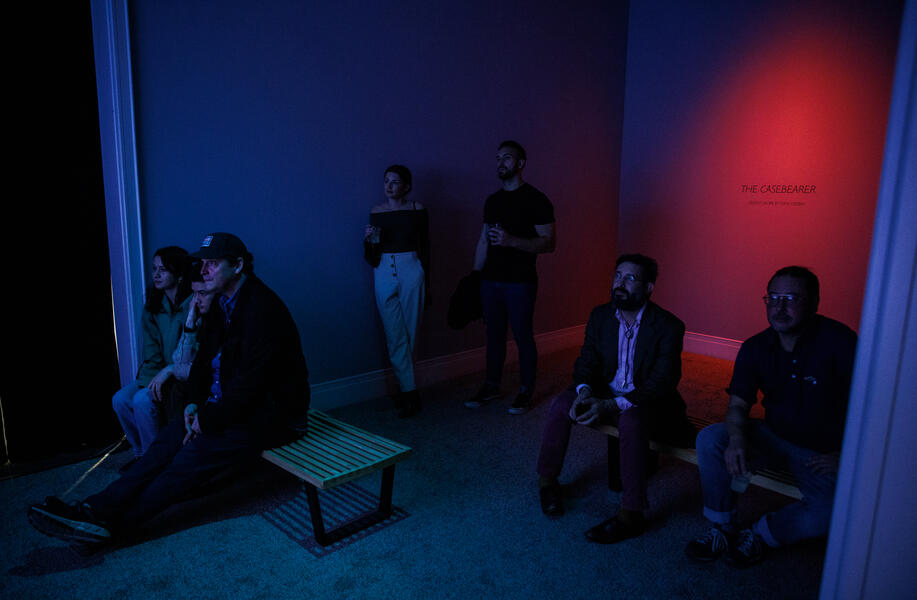 The Casebearer 2.0 install
The Casebearer 2.0 installThe Casebearer opening reception at the Ogden, 2022
-
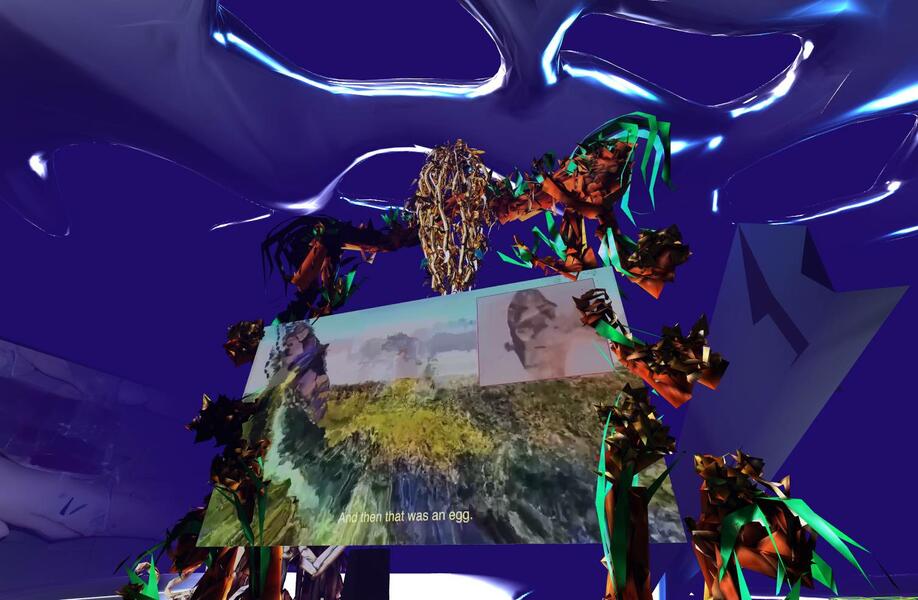 New Art City - To Spawn a Door in the Land of Broken Mirrors_ (4).jpeg
New Art City - To Spawn a Door in the Land of Broken Mirrors_ (4).jpegThe Casebearer 2.0 installed with 3D sculptures in
To Spawn a Door in the Land of Broken Mirrors @ New Art City
Curated by Nacoca Ko
Worldbuilders: Alan Ixba, Nicholas Delap, & Nacoca Ko -
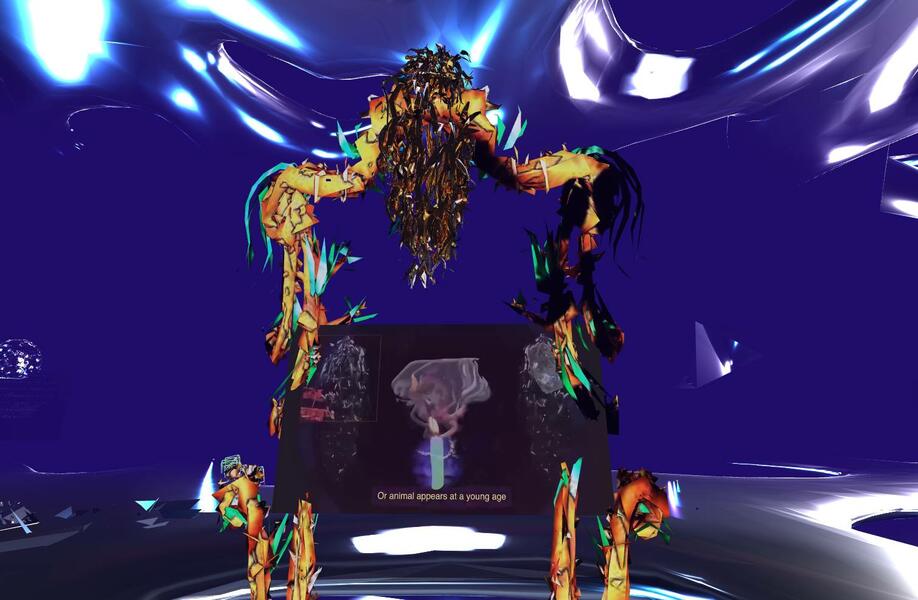 The Casebearer 2.0 installed in New Art City
The Casebearer 2.0 installed in New Art CityThe Casebearer 2.0 installed with 3D sculptures in
To Spawn a Door in the Land of Broken Mirrors @ New Art City
Curated by Nacoca Ko
Worldbuilders: Alan Ixba, Nicholas Delap, & Nacoca Ko
Seeing Glass(es)
2020
A series of decorative Mirrors
Made during a residency with Scandy.io
and Scale Workspace in New Orleans
-
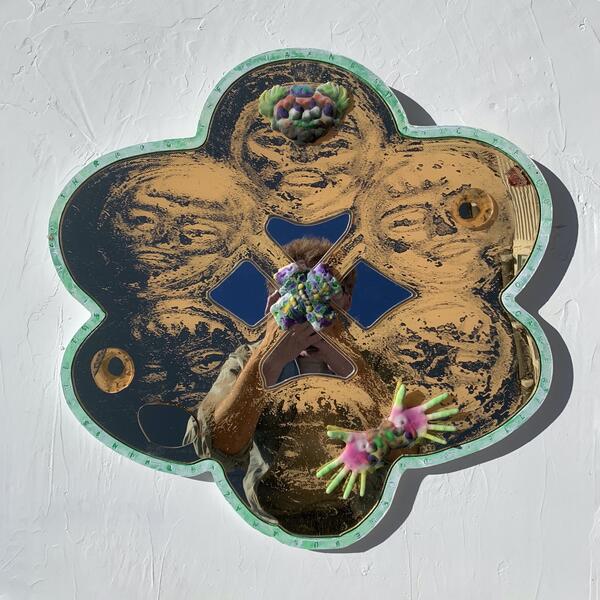 Goldenflower
Goldenflower2020
20 x 20 inches
Etched acrylic mirror, MDF, acrylic, paint, color 3D printed resin and sandstone -
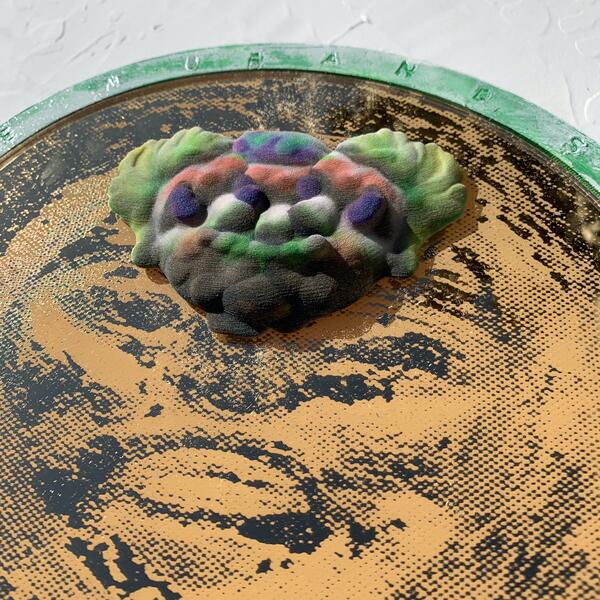 Goldenflower (detail)
Goldenflower (detail)2020
20 x 20 inches
Etched acrylic mirror, MDF, acrylic, paint, color 3D printed resin and sandstone -
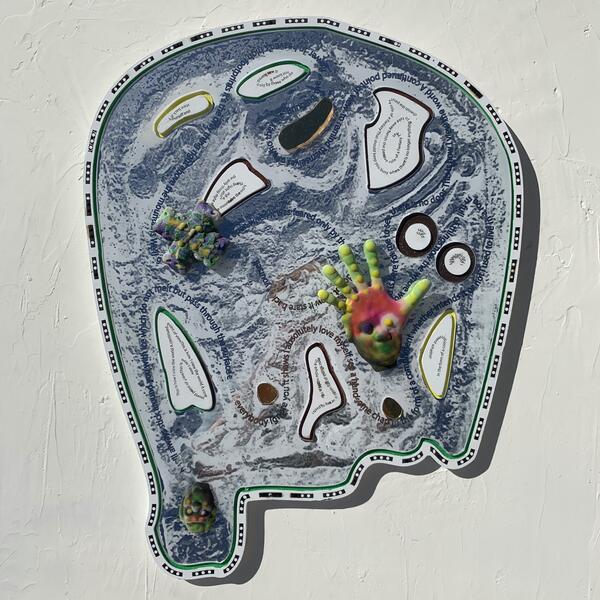 Room full of things I
Room full of things I2020
21 x 20 inches
Etched acrylic mirror, MDF, acrylic, paint, color 3D printed resin and sandstone -
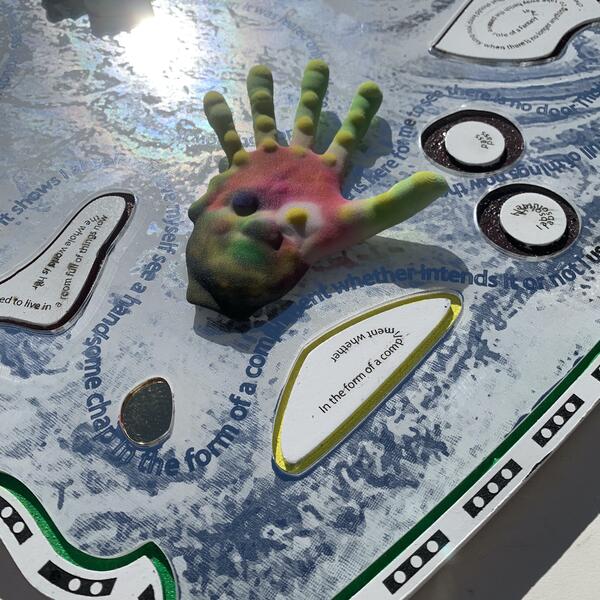 Room Full of Things I (detail)
Room Full of Things I (detail)2020
21 x 20 inches
Etched acrylic mirror, MDF, acrylic, paint, color 3D printed resin and sandstone -
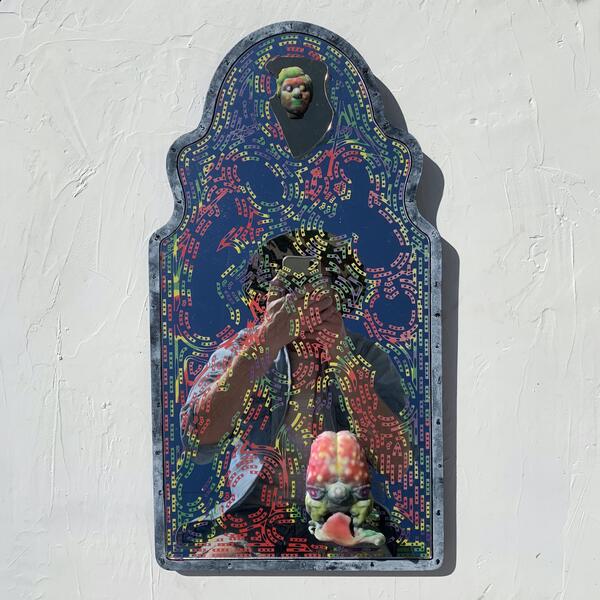 Gothfrog
Gothfrog2020
12 x 24 inches
Etched acrylic mirror, MDF, acrylic, paint, color 3D printed resin and sandstone -
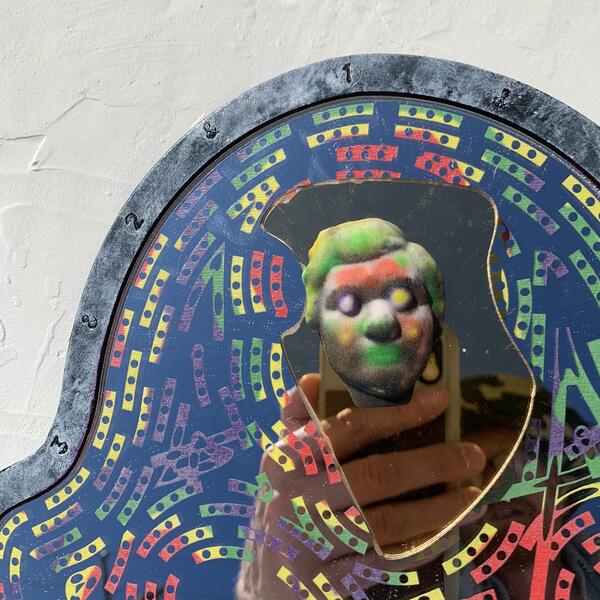 Gothfrog (detail)
Gothfrog (detail)2020
12 x 24 inches
Etched acrylic mirror, MDF, acrylic, paint, color 3D printed resin and sandstone -
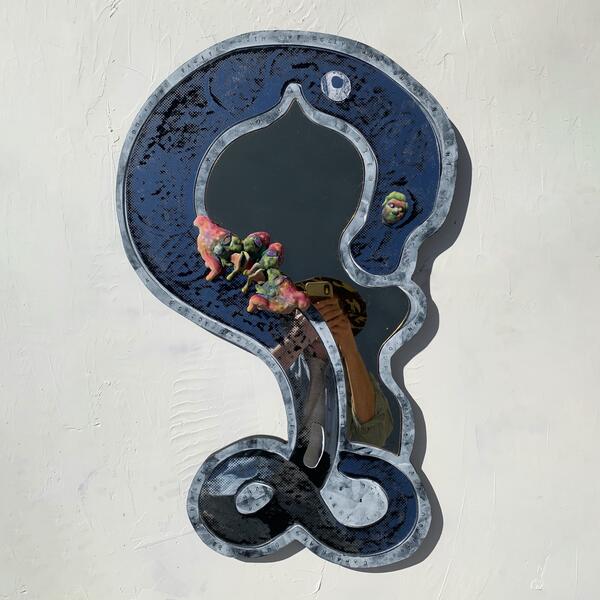 Blacksnake
Blacksnake2020
24 x 36 inches
Etched acrylic mirror, MDF, acrylic, paint, color 3D printed resin and sandstone -
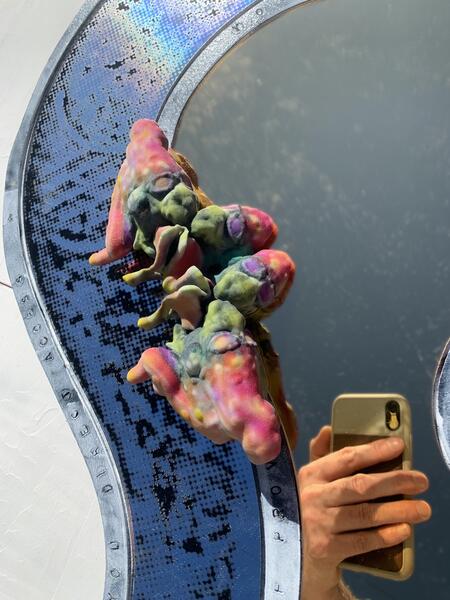 Blacksnake (detail)
Blacksnake (detail)2020
24 x 36 inches
Etched acrylic mirror, MDF, acrylic, paint, color 3D printed resin and sandstone -
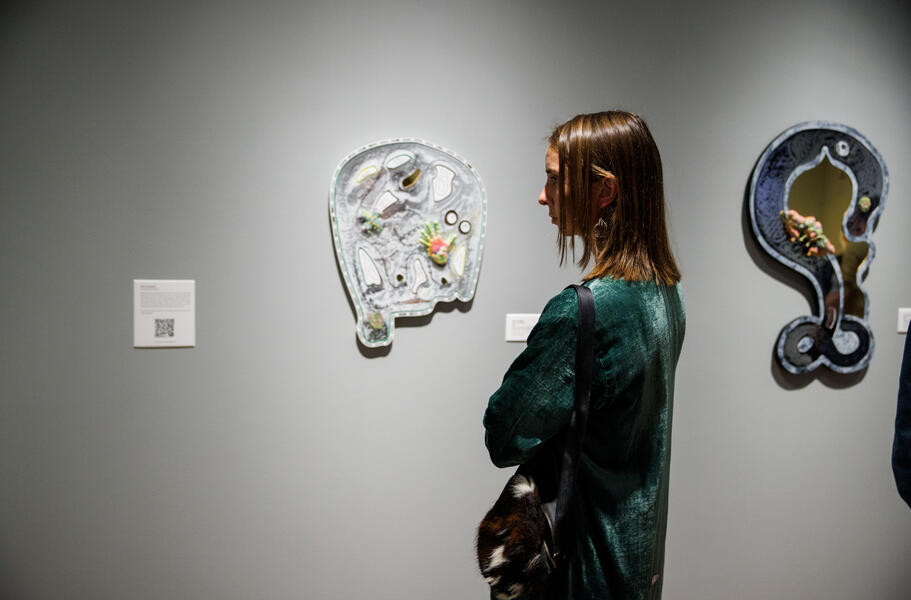 Seeing Glass(es) Install shot
Seeing Glass(es) Install shotSeeing Glass(es)
Installed at the Ogden Musuem, 2022 -
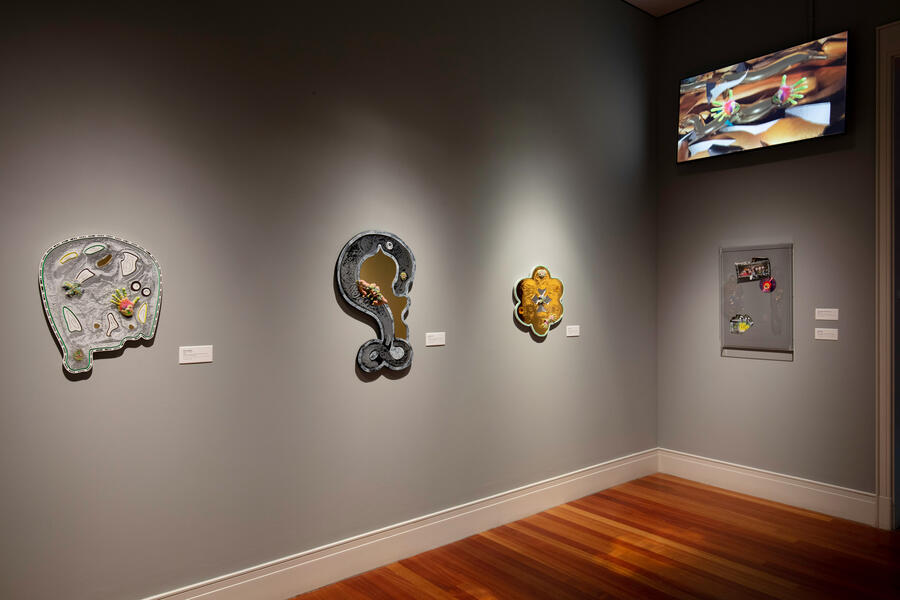 Seeing Glass(es) install shot
Seeing Glass(es) install shotInstalled at The Ogden Musuem of Southern Art, 2022
photo by Jonathan Traviesa
Svetspalonos
Svetspalonos is the product of a remote collaboration between Sophia Belkin, Dave Greber and Kanrec Sakul. The exhibition was organized in the industrial warehouse facility at Južná trieda 82 in Kosice, Slovakia in August 2019. Curated by Kanrec Sakul.
I was personally responsible for the video work and some of the textile work.
-
Svetspalonos
This is a walk-thru of the installation: Svetspalonos. A the product of a remote collaboration between Sophia Belkin, Dave Greber and Kanrec Sakul. The exhibition was organized in the industrial warehouse facility at Južná trieda 82 in Kosice, Slovakia in August 2019.
-
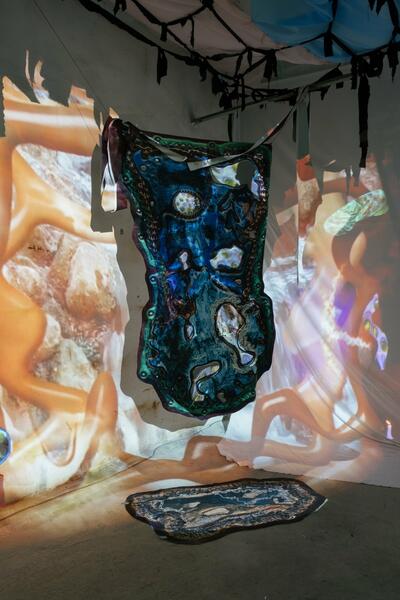 Svetspalonos 01
Svetspalonos 01Image by Ondrej Rychnavksy, 2019
-
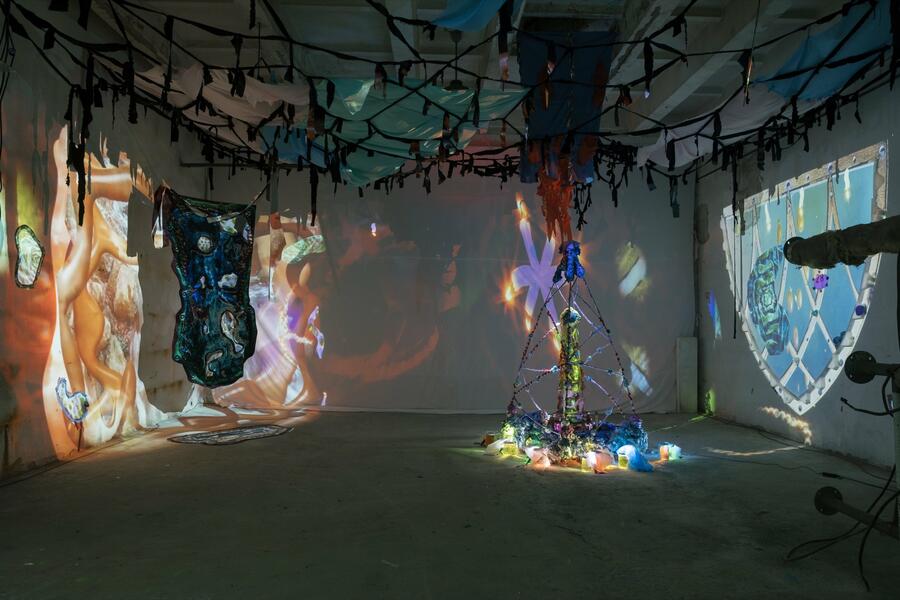 Svetspalonos 02
Svetspalonos 02Images by Ondrej Rychnavksy, 2019
-
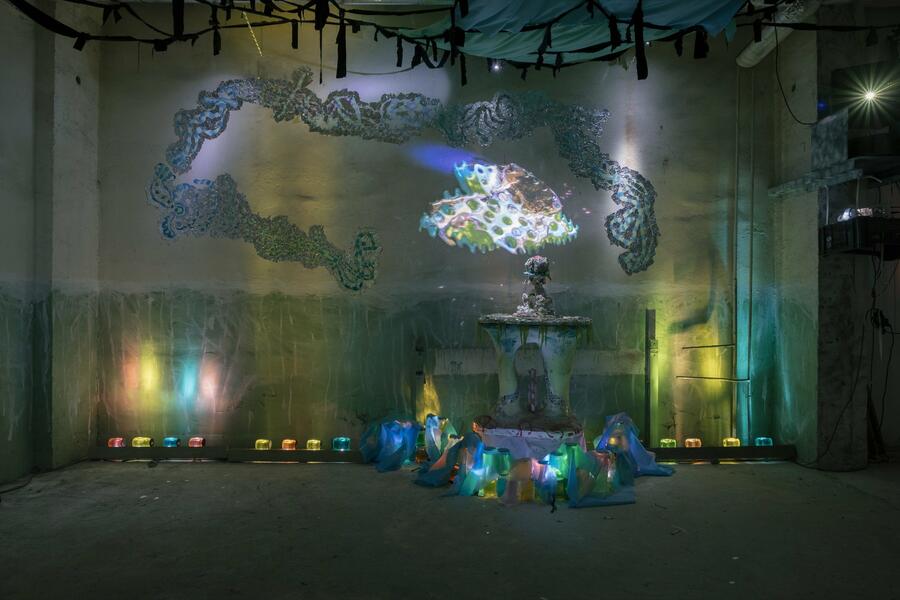 Svetspalonos 06
Svetspalonos 06Images by Ondrej Rychnavksy, 2019
-
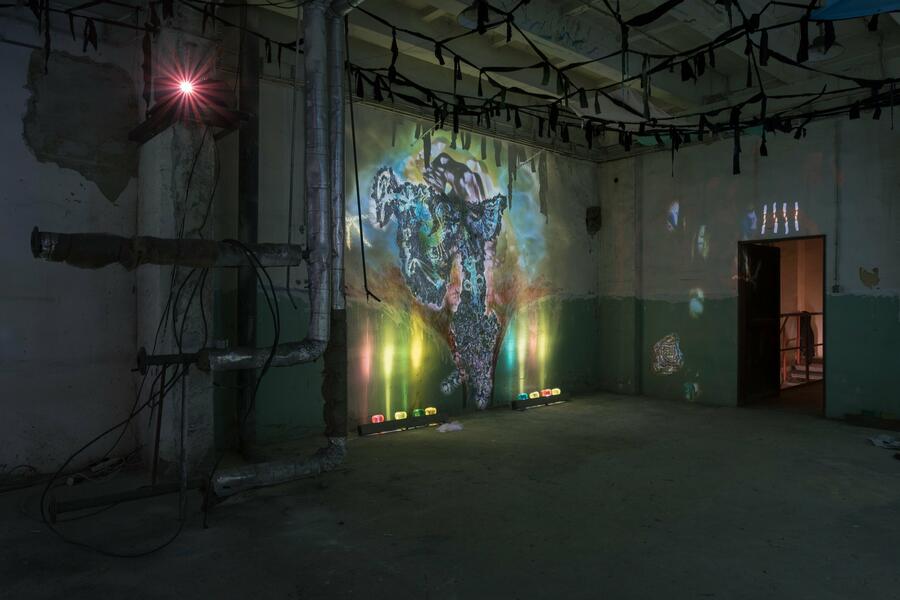 Svetspalonos 05
Svetspalonos 05Images by Ondrej Rychnavksy, 2019
-
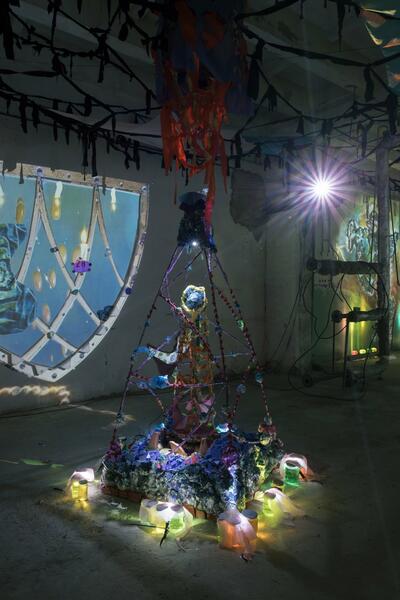 Svetspalonos 03
Svetspalonos 03Sculpture by Kanrec Sakul,
Images by Ondrej Rychnavksy, 2019 -
Svetspalonos detail
detail of Svetspalonos, 2019
Dave Greber, Kanrec Sakul, Sophia Belkin -
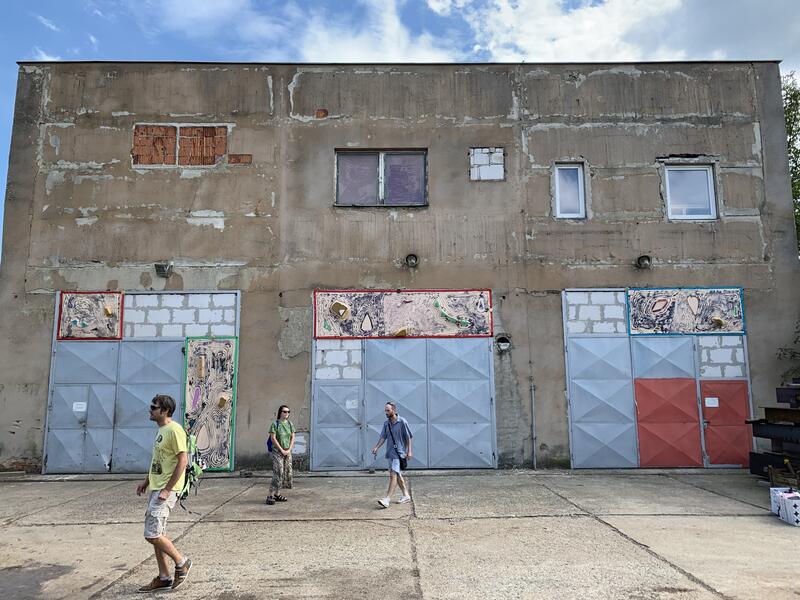 Svetspalonos venue
Svetspalonos venueSvetspalonos establishing shot
2019
textile work by Sophia Belkin -
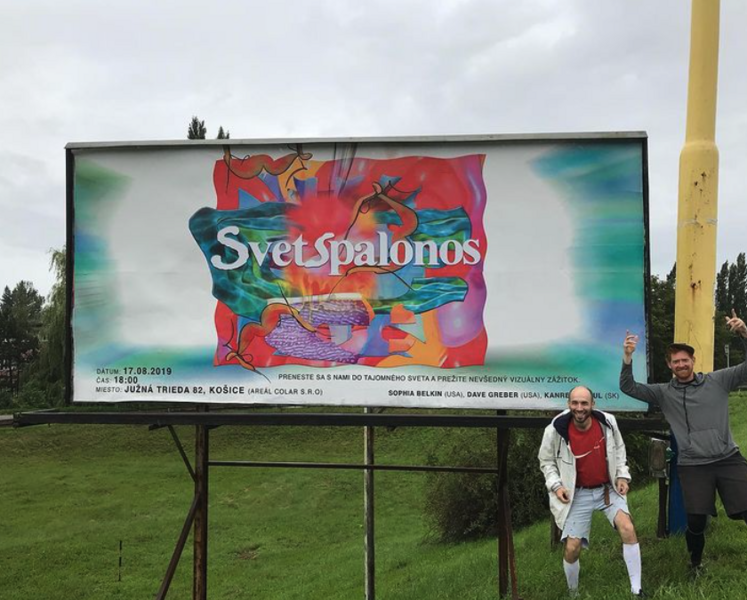 Svetspalonos Billboard
Svetspalonos BillboardA billboard advertising the exhibit on the highway
in Košice, Slovakia -
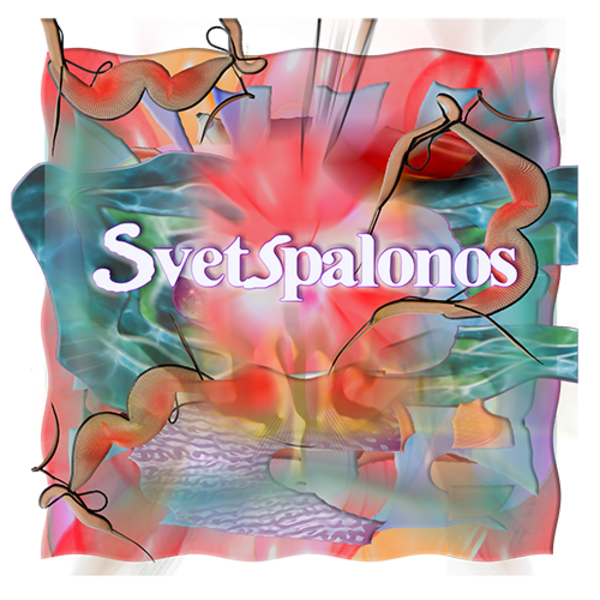 Svetspalonos Logo Design
Svetspalonos Logo DesignSvetspalonos promo design
Dave Greber, 2018
jurtakaShrines
2022
performance and augmented reality project
jurtakaShrines are a collection of unique .glbs and videos developed in New Orleans, LA and composed while hiking the Latvian portion of Baltic Coastal trail in 2022.
I wrote about the experience of the trail in this Medium article and I wrote about the technical process of creating these pieces in this Mirror entry.
This project was created as part of ASEFFC, an international online/IRL residency which reflects on the precarity and uncertainty that art workers face. And asks “How can we find space for expression and creation in a world of changing circumstances?” My intention was to create a studio-less process in which I could produce work while hiking 300 km of the Jūrtaka, in Latvia.
ASEFCC was curated by Maija Rudovska and the greater project was supported by The Andy Warhol Foundation for the Visual Arts, Latvian Culture Capital Foundation, Arts Council Norway, Viken County Municipality, U.S. Embassy in Latvia.
-
A Latvian wheel icon and audio on Līgo
AR installation/perfomance created while hiking the Jurtaka
Dave Greber
2022
-
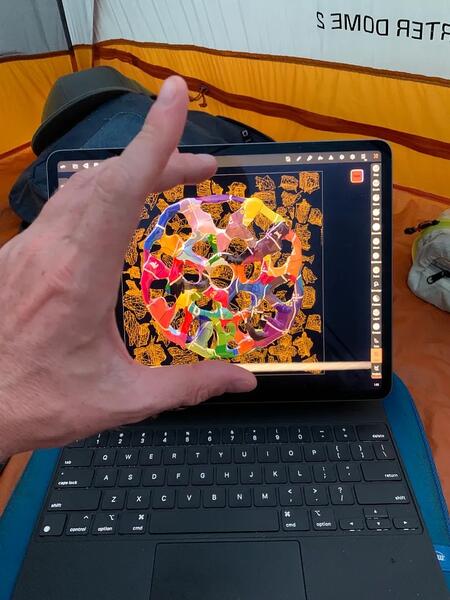 Jurtaka (process shot)
Jurtaka (process shot)Making models in the tent, 2022
-
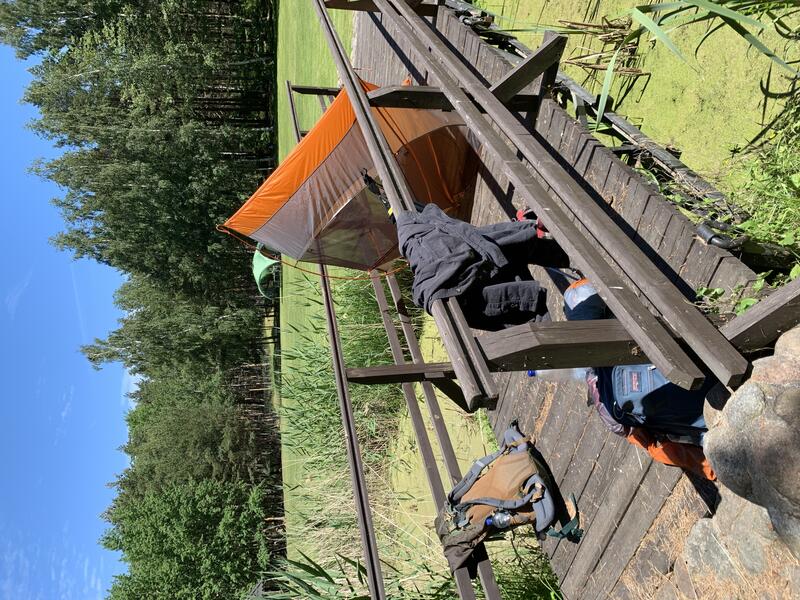 Drying out 2 (process shot)
Drying out 2 (process shot)Tent Drying Sculpture, 2022
-
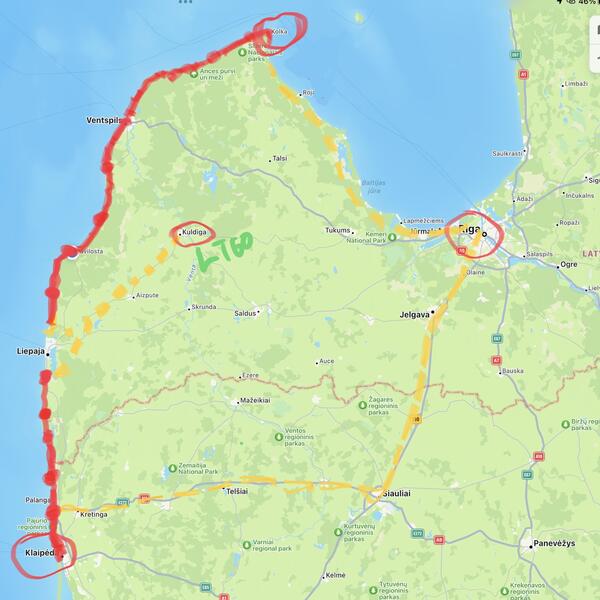 Jurtaka Hiking Route
Jurtaka Hiking RouteMy walking route/distance from Klaipeda, Lithuania to Kolka, Latvia
-
 Jurtaka Landscape
Jurtaka LandscapeDrying out on the beach, 2022
-
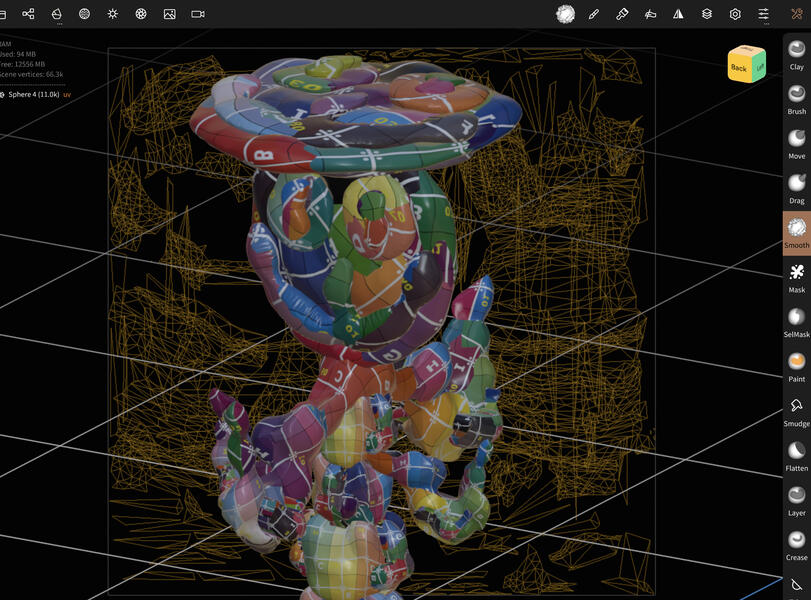 Sculpting (process image)
Sculpting (process image)Screenshot with some of the jurtakaShrine sculpting process, 2022
-
Stoneman
AR performance, 2022
0:33 video -
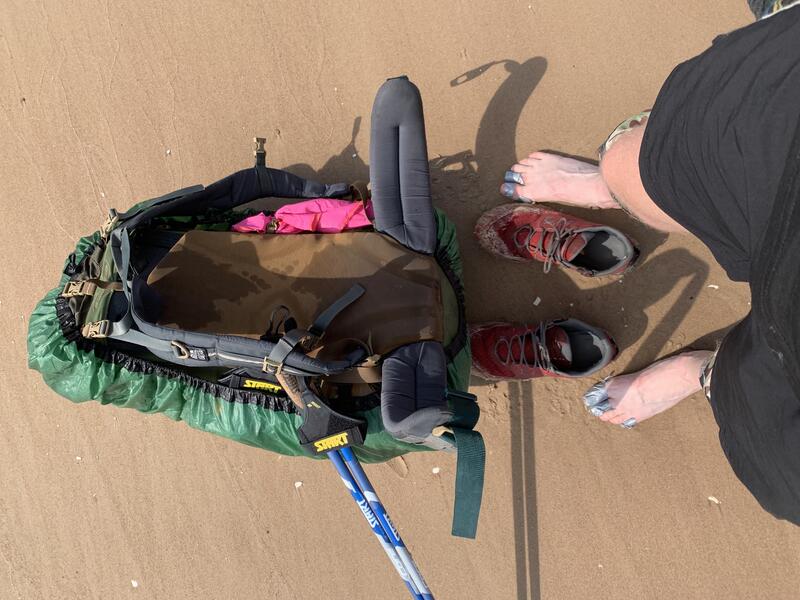 Duct feet (process image)
Duct feet (process image)My traveling studio and shelter while on the trip.
-
Gateway performance
Gateway, 2022
0:22 video -
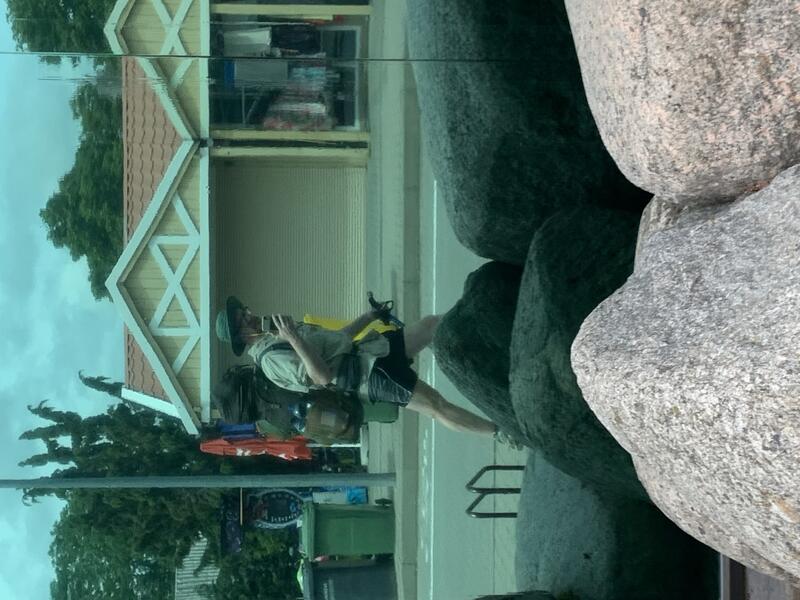 Self-portrait in glass
Self-portrait in glassSelf portrait in shop window, kilometer 137
digital image, 2022
Your Green(er/est) Stay
2019
12' x 10' x 4' 5:00 min.
video-mapped wood, bottles, trash
by Dave Greber produced and installed at Salon residency in the Canal Place Mall, New Orleans, LA
Arts Council New Orleans
&
2019
12' x 20' x 6' 5:00 min.
video-mapped insulation foam, bottles, trash
SITE GALLERY HOUSTON @ The Silos at Sawyer Yards
-
Your Greener Stay + installation walkthrough
Walkthrough of A Greener Stay (2019)
by Dave Greber produced and installed at Salon residency in the Canal Place Mall, New Orleans, LA
Arts Council New Orleans -
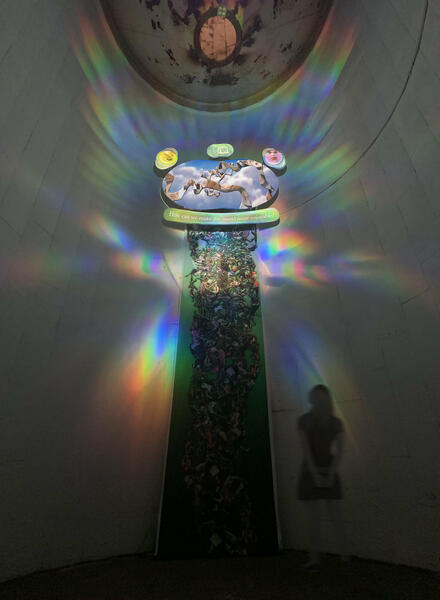 A Greenest Stay installation
A Greenest Stay installationA Greenest Stay
feat. the same content as A Greener Stay but was reconfigured for a former grain silo
at Sawyer Yards, Houston Texas
Sculpture Month Houston, 2019
curated by Volker Eisele -
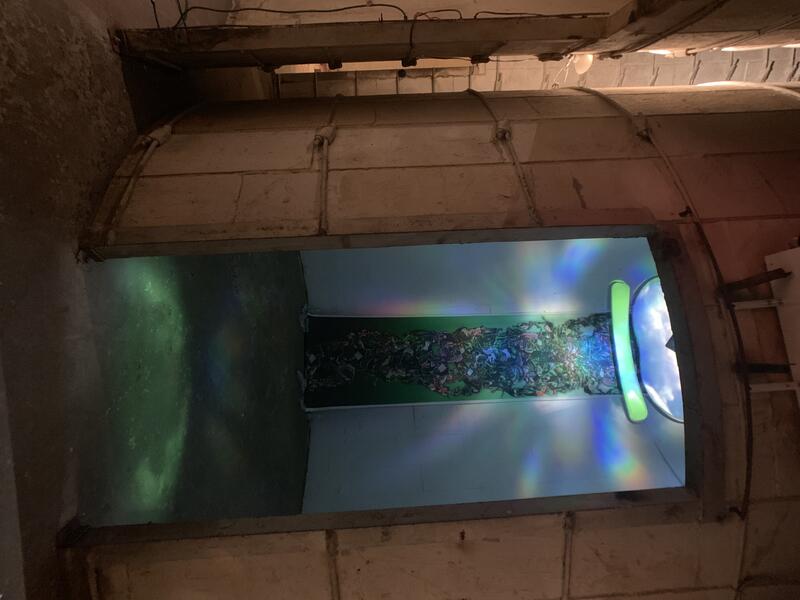 A Greenest Stay context shot
A Greenest Stay context shotA Greenest Stay
2019
installed a Sawyer Yards, Sculpture Month Houston -
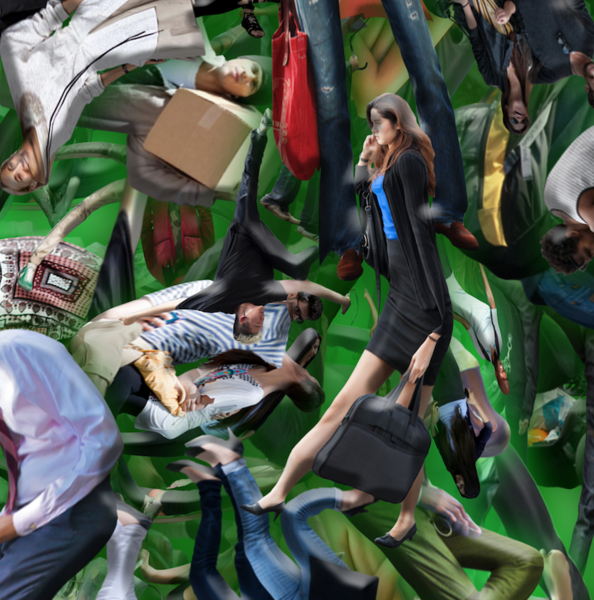 greber_greeneststay5.png
greber_greeneststay5.pngDave Greber
A Greenest Stay, 2019
Sculpture Month Houston, Sawyer Yards -
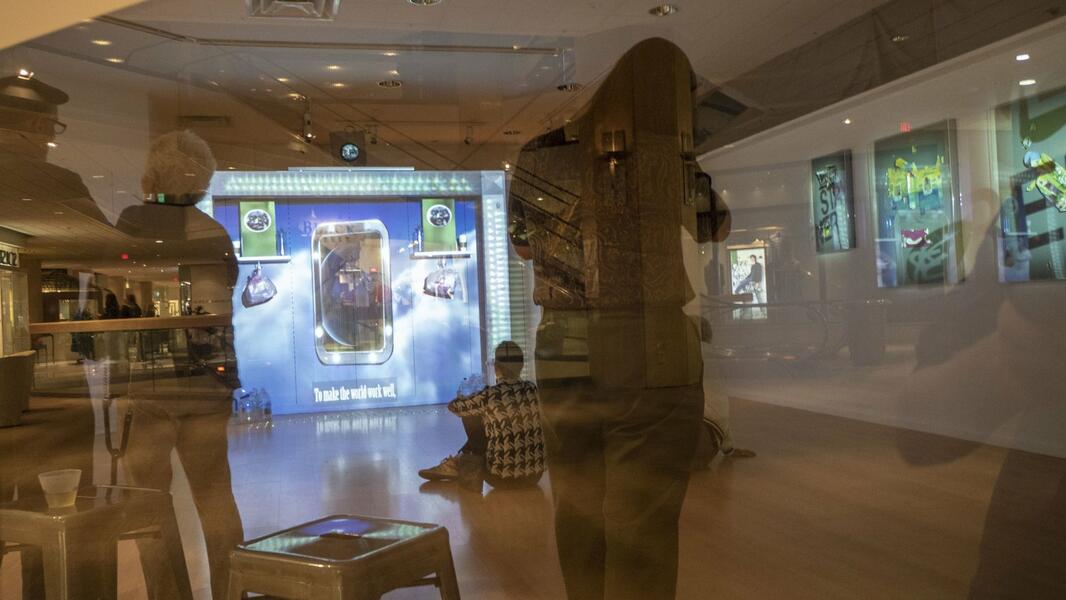 A Greener Stay | Reception
A Greener Stay | ReceptionA Greener Stay reception, 2019
-
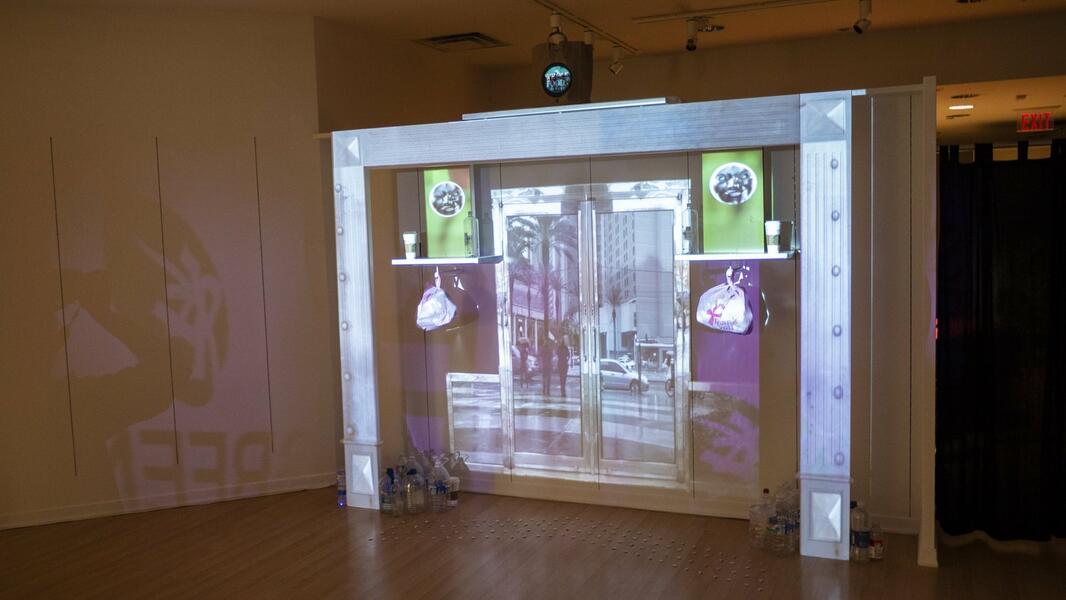 A Greener Stay | alternate
A Greener Stay | alternateA Greener Stay
Dave Greber
2019 -
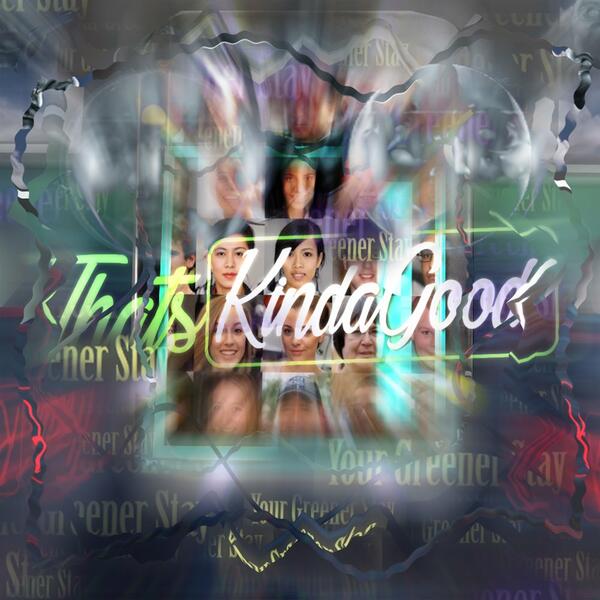 Greener Stay Flyer
Greener Stay FlyerPromo flyer art for Your Greener Stay, 2019
-
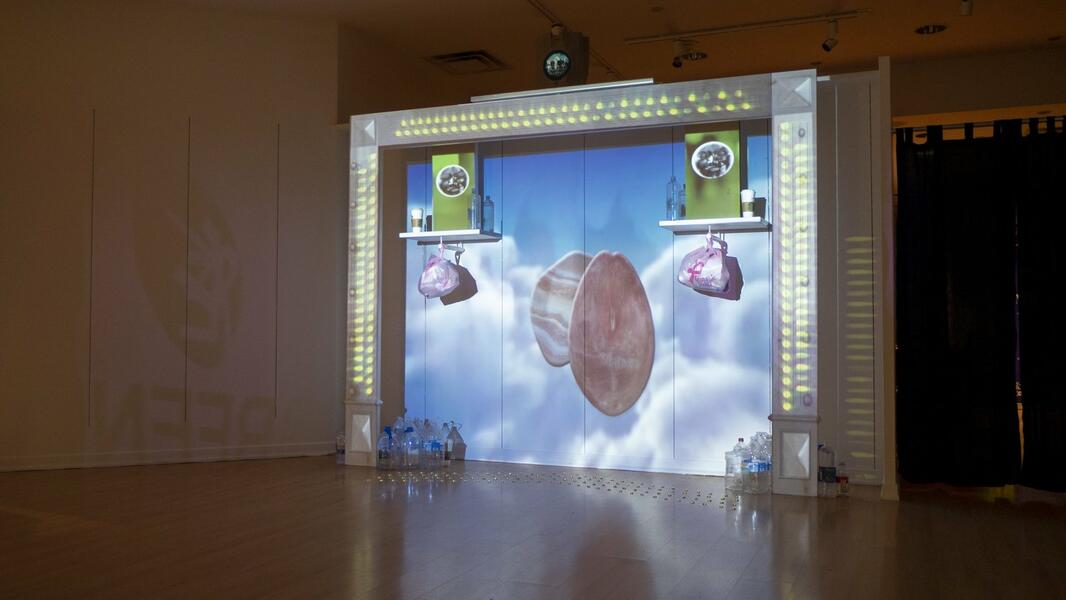 A Greener Stay | Installation Shot
A Greener Stay | Installation ShotDave Greber
2019
12' x 10' x 4'
5:00 min.
video-mapped wood, bottles, trash -
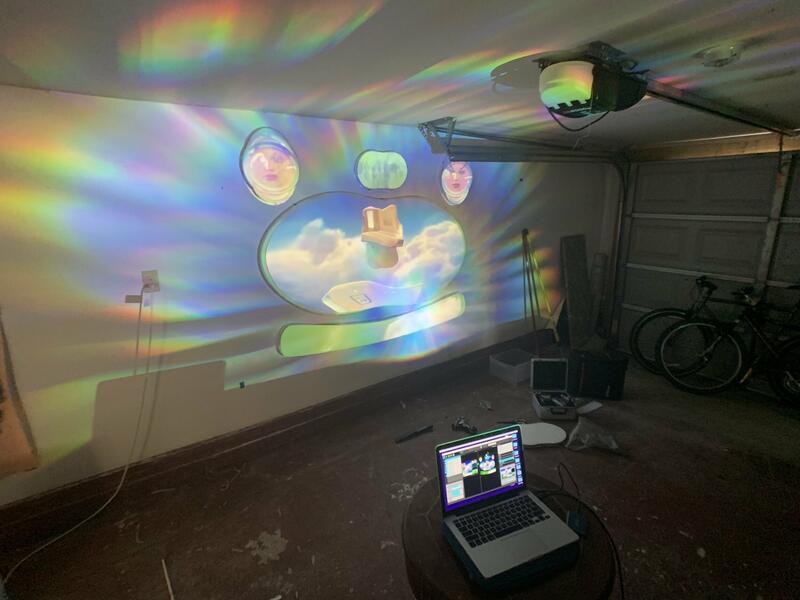 A Greenest Stay process shot
A Greenest Stay process shotA Greenest Stay in development
video-mapped foam screens
Dave Greber, 2019 -
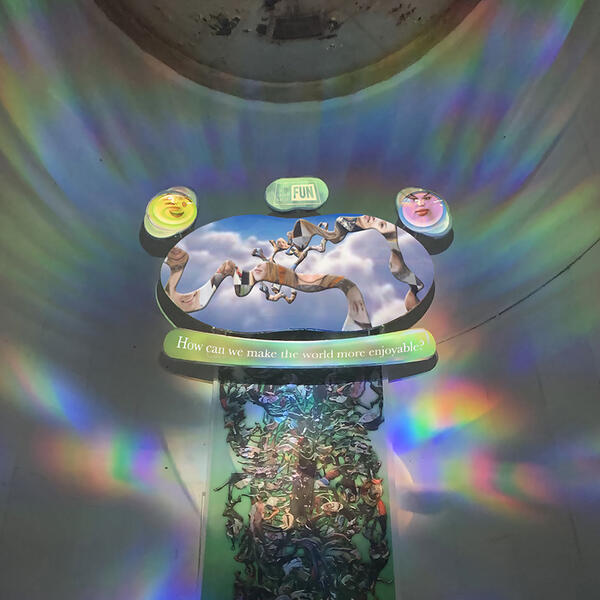 Your Greenest Stay (2019)
Your Greenest Stay (2019)Dave Greber, 2019
Pothole Geodessia
2018
Dave Greber and Sophia Belkin
12' x 10'
Video projection on inkjet-printed polyester, found artifacts, thistles
Collaboration featured as part of the Narva/Detroit symposium held at the Narva Art Residency, Estonia, August, 2018.
Statement:
Pothole Geodessia is a hybrid of the industry and natural environment of Narva.
The history books tell the story of Krenholm as one of manufacturing decline.
Yet if we think of the landscape as an evolving symbiosis between nature, humans, and technology-
we see that the narrative changes.
The land is as alive as ever. It breathes, pulses and slithers.
The snails come out after the rain and the conveyor belt keeps moving along.
Pothole Geodessia on hübriid Narva industriaalsest ja looduslikust keskkonnast.
Ajalooraamat räägib loo Kreenholmist kui manufaktuuri allakäigust. Jah, kui me
vaatleme maastikku, kui pidevalt muunduvat sümbioosi loodusest, inimestest ja
tehnoloogiast, siis võime tõdeda, et narratiiv on muutumas. Tööstusmaastik on
tärganud ellu. See hingab, pulseerib ja libiseb. Teod roomavad vihma järel oma
kodadest välja ning konveierilint liigub omasoodu edasi.
В книгах по истории всегда рассказывают об упадке производства
Кренгольмской мануфактуры. Но если посмотреть на окружающее нас
пространство как на постоянно меняющийся симбиоз природы, людей и
технологий, то можно сказать, что история меняется. Промышленный
ландшафт ожил. Он дышит, пульсирует и развивается. Улитки выползают
после дождя, а конвейер продолжает работать.
-
Pothole Geodessia
This was a collaboration with another artist (whom I collaborate with often), featured as part of the Narva/Detroit symposium held at the Narva Art Residency, Estonia, in August, 2018.
2018
Dave Greber and Sophia Belkin
12' x 10'
Video projection on inkjet-printed polyester, found artifacts, thistles -
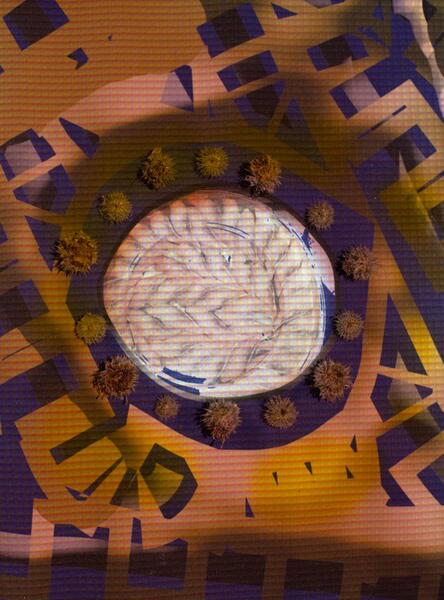 Pothole Geodessia (detail)
Pothole Geodessia (detail)Dave Greber and Sophia Belkin, 2018
-
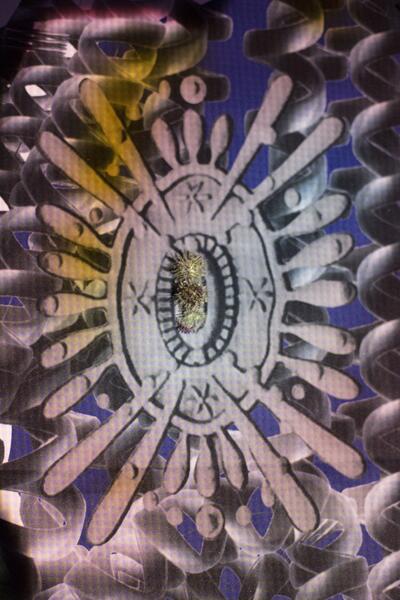 Pothole Geodessia (detail)
Pothole Geodessia (detail)Dave Greber and Sophia Belkin, 2018
-
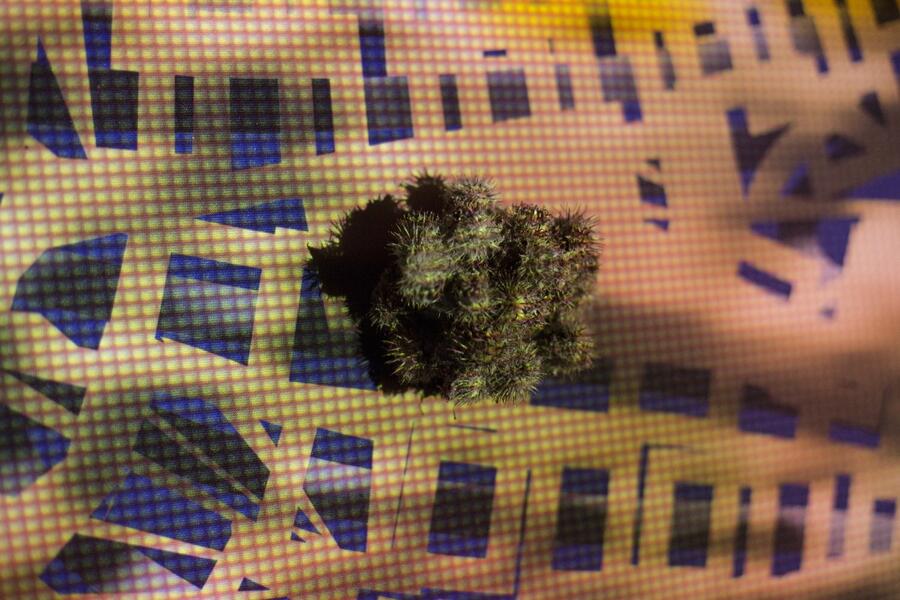 Pothole Geodessia
Pothole Geodessiadetail shot, 2018
-
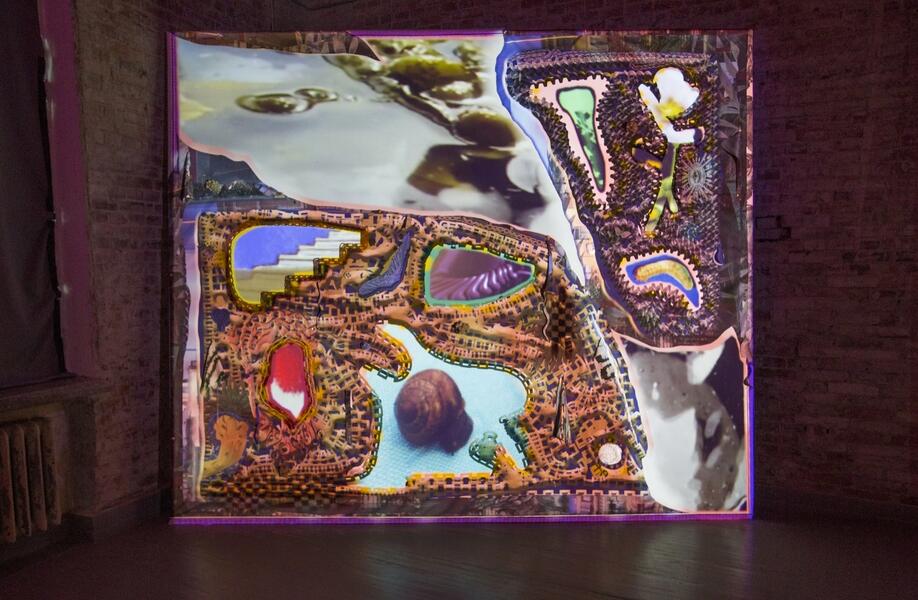 Pothole Geodessia
Pothole Geodessiadetail shot, 2018
-
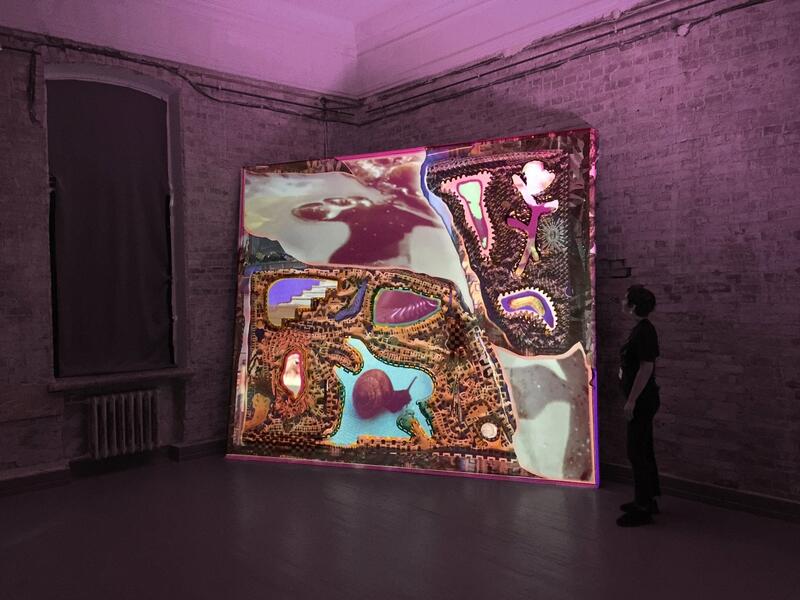 Pothole Geodessia (scale shot)
Pothole Geodessia (scale shot)Dave Greber and Sophia Belkin Collaboration, 2018
-
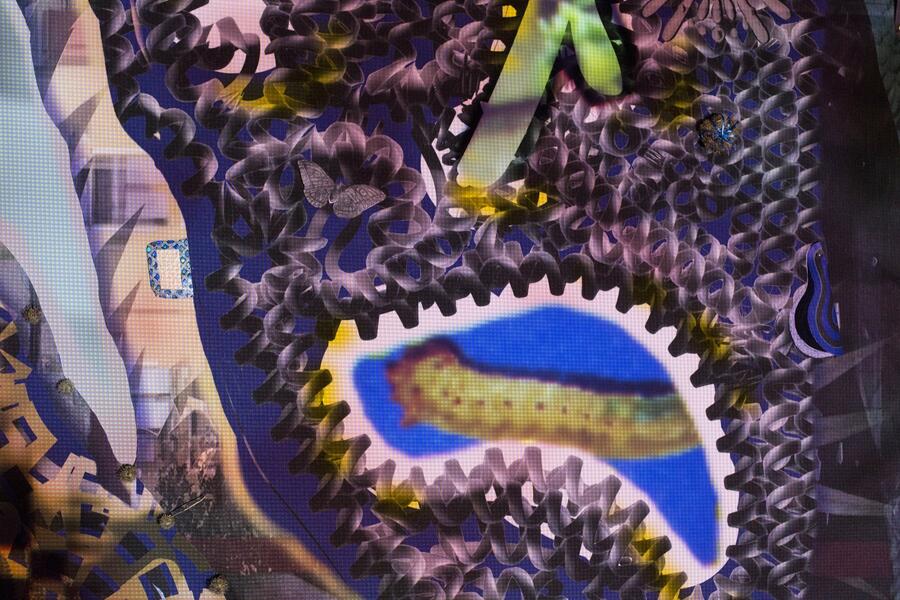 PotholeGeosessia 4
PotholeGeosessia 4detail shot | projection on printed textile with objects
-
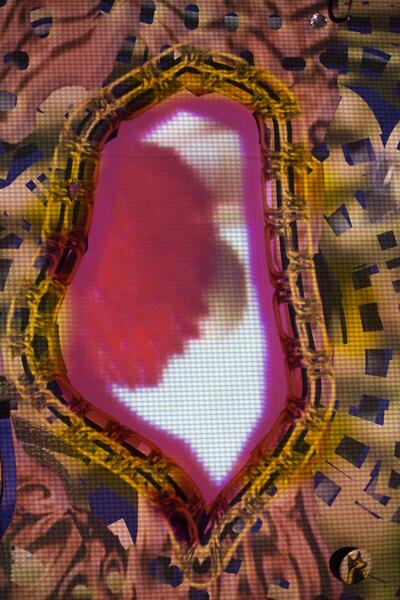 Pothole Geodessia 4
Pothole Geodessia 4Pothole Geodessia detail | projection on printed textile
